#Interior Designer Cultural Expectations
Explore tagged Tumblr posts
Text
How Interior Designers Recommend Office Furniture in Dubai
When exploring how interior designers recommend office furniture in Dubai, several factors come into play, including the unique cultural, economic, and environmental aspects of the region. Let’s delve into these considerations with a deep discussion, incorporating questions to probe further and provide clarity, along with an example to illustrate the process. 1. Cultural Sensitivity and…
#Functionality Design#Interior Designer Cultural Expectations#Interior Designer Economic Considerations#Interior Designer Recommendations#Interior Designers in Dubai#Modern Furniture Brand Alignment in Dubai#Modern Office Fit out#Modern Office Furniture Considerations in Dubai#Modern Office Furniture Economic Considerations in Dubai#Modern Office Furniture Environmental Impact in Dubai#Modern Office Furniture Social Spaces#Modern Office Furniture Technological Integration#Office Fit Out#Office Furniture#Office Furniture Climate Considerations#Office Furniture Cultural Sensitivity and Aesthetic Preferences#Office Furniture Space Utilization and Ergonomics#Office Furniture Sustainability#Technology Integration
1 note
·
View note
Text
One of the topic choices for a big final essay I have to write by Monday is comparing how Alexandra Kollontai and Frantz Fanon depict the role of women in revolution and I’m like yayyyy nobody will escape my criticism yayyy!!!
#a dying colonialism is a hugely important work but ofc you’ll be reading it and going ‘okay but how did the women FEEL about that’#designation of private vs public is def going to be. hugely important here#in terms of where women are allowed and expected to exist#like you have kollontai writing as if private life has been completely abolished#the home itself abolished#worker homogeneity and the duty to the state translating as a complete dissolution of the private sphere#whereas fanon is concerned w maintaining aspects of algerian culture that limit or narrow women’s public visibility#the juggling of preserving the home and private life as the natural realm of women with socialist revolution#it’s really interesting.#either way women aren’t really granted a described interiority#w kollontai it’s bc the private dimension of the self has ceased to exist#w fanon it’s bc that interiority is deemed something inappropriate to make visible#*sigh*#maybe we just let the women talk#and not the ones literally born to the bourgeois class *cough cough*#edit: I think fanon does grant some interiority but it’s conspicuously only ever granted in the context of the revolution#he positions the algerian woman’s body as THEY setting for the revolution and describes the anxieties and grim determination associated w#this#while simultaneously affirming the idea that algerian women have no choice in this#that they are *required* to meet impossible standards specifically as revolutionary action#he grants them the dimension of martyr but presents no alternative path#his criticisms of the violence of colonialism on algerian women’s bodies are ofc all poignant and precisely deconstructed#but still there’s no reality where algerian women don’t have to suffer#it’s so. meaty. rlly love digging into it.
5 notes
·
View notes
Text
If you're curious, I can provide some perspective on why people who may typically gravitate towards more traditional FPS games may not appreciate the harvesting mechanics. In a nutshell, it's about expectations (whether they be well or poorly managed) and what the player wants out of a game when they sit down to play.
In shooters that have an unlock progression system, you typically unlock new weapons and equipment through your performance in the game and the mere act of progressing through it. That may look like completing a certain number of matches, beating certain missions, defeating certain enemies, getting certain achievements or completing challenges, etc. But what are you ultimately doing to accomplish all those things? Shooting things. You get new weapons and gear by using weapons enough and in different ways.
I've only played Far Cry 4 in the Far Cry series, but that's essentially how you unlock new weapons in the game. There's no aspect where you primarily need to switch to a very different type of task--like solving puzzles--to unlock most weapons and equipment. In Avatar: Frontiers of Pandora, the main way these unlocks are promoted to you is exploration-based and mildly luck-based--search for and through the correct area, then encounter the plant while it's night and raining-- and has a tiny puzzle-solving dimension as well: figure out which of eight directions is the correct way to move your mouse/controller to harvest the plant. In other words, the game is unlike most shooters in that you cannot shoot your way to a stronger vest or bow or arm guard. While you can shoot your way to better human weapons, for the Na'vi weapons and all the armor it seems like you typically need at least one gathering-based component. You can shoot and get an animal hide or tooth, but the other parts of the recipe may ask for moss, bark, a shell, some other plant product, etc.
The game wants you to explore and gather, but for certain people who strongly prefer FPS games, they recognize the Far Cry-like skeleton beneath Frontiers of Pandora and consequently expect FPS-like mechanics and a more Far Cry-like experience. The people really pushing back against exploration and puzzle-solving (the gathering mechanic) as a way to progress gear-wise are like people who strongly prefer traditional Mexican food going out to eat and intending to have traditional Mexican food, but unknowingly going to a Korean-Mexican fusion restaurant and being kind of annoyed that they have to ask the waiter not to put gochujang cabbage slaw and diced Asian pear on their tacos. Their preferences are perfectly valid, but the restaurant is ultimately Korean-Mexican fusion and is also perfectly valid in offering up its own vision to the public to experience. The customers need to modulate their expectations and not expect either pure Mexican or pure Korean, and yeah it is annoying if you didn't realize what the restaurant was before sitting down, but it's also ultimately not the restaurant's fault if you didn't read their menu posted outside the door.
We can expand the two-cuisines metaphor to two different experiences that people might look for in this video game, and of course it's possible to equally want both or more or less of one or the other. On one hand we have a desire to experience the world of the game as the characters within it do-- what's it like to be Na'vi and live in and interact with this world? How does their culture filter and reflect that experience? At the very least, the gathering mechanic and Hunter's Guide represent a very basic simulation of Na'vi using generations of accumulated cultural knowledge to go out and collect things that are the literal building blocks of their material culture and beyond. For people who heavily prefer Korean food over Mexican, this is the main attraction of the game, and the combat is just something to get over with as painlessly as possible.
For people who count FPSs in general as a top genre of interest, the best way I think I can describe the interest to you is like being really into the challenge of team sports, using everything at your disposal--your sports equipment, your training, the physical layout of the field or court itself, the weather, etc.--to strategize against and beat a team that is intelligently employing the exact same sort of calculus against you. It's a challenging competition where lots of tiny things matter, you work as a team (or hopefully with a really smart AI), and winning is proof/validation of your own skill and preparation that you really worked for. For some people like this, the cultural meaning behind Na'vi bodypaint or the biology of a certain plant are very much secondary to questions like "how can I use this pattern or vest to prevent the other team (the RDA) from seeing me and targeting me?" or "how can I use the flammable nature of this plant and the geological formations of this area to set up a trap for the RDA soldier patrolling the back entrance to the base I need to capture?"
I know "the devs" aren't a monolith all sharing one opinion, but I think a lot of them might actually be happy that people who more strongly prefer one approach/play-style over the other can adjust the game to better suit their preferences and still enjoy playing! And I say this as someone who has posted rare-pair fanfiction and original works to AO3--even getting one person who really likes and appreciates those stories makes it feel like a worthwhile effort regardless of the even greater numbers of people who would not like or even care to read those stories, and I've seen a lot of people online who absolutely love exploring and reading the Hunter's Guide and think the gathering system is pretty cool (and maybe not even detailed enough!)
I've been playing a whole lot of Avatar: Frontiers of Pandora, and it's been pretty great so far. I'm not super into the combat; it's not my thing, and I'm not very good at it. But the environment is incredible! And I'm a sucker for xenobiology, so just wandering around and marveling at all the different plants and animals is more than enough to allow me to enjoy myself.
I wandered onto YouTube to look at some videos, namely ones that discuss fun little secrets and tips that one may miss while playing.
And y'all, I had another one of those moments where I don't really "get" what people want put of their games.
So like, one of the mechanics in this game involves harvesting resources. Pretty standard thing in any sort of survival/crafting game, but AFOP makes it so much more interesting. Each harvestable has to be carefully tilted a certain way (with mouse or controller) to harvest it properly. Otherwise, the quality suffers, reflected in an item's stats. In addition, each one has a specific environmental factor that affects its quality. Certain plants are best harvested when it's raining. Others with its dry. Others at night. And so on.
One of the YouTube videos I watched had the guy going on and in about what a waste of time the harvesting mechanic was, and how there was an option to turn it off that should absolutely be taken.
Which. Like. I love having that option for accessibility! But waving off an immersive, unique mechanic as something annoying and time consuming? Specifically recommending turning it off so you can just run around and collect everything you see, with no effort, like all the other games?
I was so disappointed in that. Like... this game tries so hard to immerse you in its world, and part of that is taking care and harvesting mindfully, like a Na'vi would do. Learning and memorizing the particulars of every plant. Taking time and not just... I don't know. Running around grabbing shit and just rushing about to shoot more things.
I've seen people complain that the game is just "Far Cry with Blue People," and then they go ahead and recommend skipping gameplay to essentially make it more like Far Cry. Or any other generic FPS.
And I don't understand it. It's like... you see a thing that devs clearly put in there to make things more immersive, to give their game a certain feel, and you just shove it aside so that you can reduce the game down to its most basic, dull components. Why? What is even the point of making all of these games unique if you forcibly avoid what makes them such?
I mean... people should be able to play games as they like, of course. But it's weird to specifically identify a unique mechanic as some sort of flaw that needs to be bypassed.
I dunno. It just makes me feel kind of sad and put out. It makes me think of devs working hard to perfect a thing that they feel is going to help make their game unique and enjoyable, only for someone to shove it aside because it gets in the way of the most basic gameplay in existence.
Bleh.
#I mean I play stuff like both Insurgency Sandstorm and the Animal Crossing vacation island interior design DLC#so the best I can do is offer reasons why I think both shooters are fun and why diving into cultural stuff and worldbuilding is too#though I don't need to justify that second part to a tumblr audience largely already firmly on that side of things#This is the website where I had literally never seen anything FPS related on my dash until people somehow discovered Soap and Ghost from CoD#that was a surprise lol#But yeah expectations are EVERYTHING#They can radically reframe/alter your entire experience of something
28 notes
·
View notes
Text


★ majors/higher education | signs in the 9th house ★

★ book a reading ★ ★ masterlist 1 ★ ★ masterlist 2 ★

★ aries in the 9th house ★
majors tied to action, leadership, and bold thinking—aries energy thrives in fields that require initiative and innovation. think degrees in law (debate, litigation), sports science (coaching, performance training), or military science (strategy, defense). you might also pursue something competitive like entrepreneurship or pre-med, where you’re constantly challenged to stay ahead. aries’ restless energy makes hands-on, fast-paced majors appealing, so engineering or mechanics could also fit. their love of adventure means international relations or global studies might appeal, especially if you want to explore different cultures or engage in diplomatic work. creative fields like film production or performing arts (theater, dance) might call to you, as aries loves self-expression and commanding attention. expect a major that keeps you moving and doesn’t confine you to routine; aries doesn’t do well in stagnant or overly theoretical environments. you might also gravitate toward activism-based studies, like political science or criminal justice, where you can champion causes and fight for change. your education could take unexpected turns, as aries energy often thrives in challenges and chaos—possibly leading you to switch majors mid-way when something more exciting catches your attention.

★ taurus in the 9th house ★
majors rooted in stability, beauty, and value-driven work. taurus energy is practical yet artistic, so degrees in interior design, architecture, or fine arts (sculpture, painting) align well with their aesthetic sensibilities. you might also find satisfaction in agricultural sciences or environmental studies, connecting with the earth and sustainable practices. taurus’ practical mindset leans toward finance, economics, or business—majors that ensure long-term security and tangible rewards. culinary arts or nutrition could appeal, especially if you enjoy creating or nurturing through food. degrees in real estate or hospitality management might align with taurus’ love of comfort and luxury, allowing you to curate beautiful spaces or experiences for others. taurus in the 9th craves knowledge they can use practically, so hands-on fields with clear career paths are key. psychology or social work might also resonate, especially if you’re drawn to steady, nurturing roles that help others build better lives. you could lean toward something like cultural studies or anthropology if there’s a focus on the sensory aspects of different traditions (food, art, craftsmanship). whatever you choose, it’ll likely be a slow, deliberate decision, as taurus takes their time to find what truly aligns with their values.

★ gemini in the 9th house ★
majors focused on communication, ideas, and variety—gemini thrives in fields that stimulate the mind and offer flexibility. journalism, creative writing, or media studies are strong fits, as gemini excels in storytelling and connecting with others. degrees in education (teaching, curriculum development) might appeal, especially if you’re drawn to sharing knowledge in dynamic environments. gemini’s curiosity could also pull you toward marketing, public relations, or advertising—majors that let you craft messages and explore trends. linguistics, foreign languages, or international studies might resonate, allowing you to learn and communicate across cultures. gemini’s love of tech and information could lead to fields like computer science, digital media, or data analysis. their versatility means you might combine seemingly unrelated interests, like a double major in psychology and graphic design or sociology and creative writing. gemini doesn’t thrive in rigid or overly specialized fields; they need variety, collaboration, and intellectual stimulation. philosophy or political science could also align, especially if you enjoy debating and exploring complex ideas. gemini in the 9th house often means your education will involve constant learning and adapting—expect internships, networking, and possibly changing majors to keep things fresh.

★ cancer in the 9th house ★
majors that center around nurturing, emotional connection, and building safe spaces for others. cancer energy thrives in fields like psychology, counseling, or social work—anything where you can provide care and emotional support. education might also appeal, particularly in early childhood development or special education, as cancer loves nurturing young minds. degrees in nursing, midwifery, or healthcare align with cancer’s caregiving nature, especially if you’re drawn to maternal health or pediatrics. cancer’s connection to home and history could lead to majors like interior design (creating comforting spaces) or history and anthropology, focusing on family lineage or cultural traditions. culinary arts or hospitality management could also resonate, especially if you love bringing people together through food or creating warm, inviting environments. cancer in the 9th might draw you toward majors that focus on healing or personal growth, like alternative medicine, holistic therapy, or even spiritual studies. film and media studies could appeal if you’re interested in storytelling with emotional depth. whatever you choose, it’s likely tied to themes of care, protection, and emotional resonance. you might also feel pulled toward studying abroad in places that feel familiar or tied to ancestral roots, seeking deeper connections with your personal history.

★ leo in the 9th house ★
majors centered around creativity, leadership, and self-expression. leo thrives in fields where they can shine, so performing arts (theater, dance, or music) might be at the top of your list. film studies or directing could appeal if you want to create bold, visual stories that captivate an audience. degrees in business, entrepreneurship, or leadership studies might also resonate, as leo loves being in charge and inspiring others. if you’re drawn to communication, public relations or marketing with a focus on branding and storytelling could fit. leo’s dramatic flair might pull you toward law—especially areas like courtroom litigation where your charisma and presence can shine. education, particularly as a professor or in roles that allow for mentorship, could also appeal, as leo loves to teach and lead. graphic design or fashion might be your calling if you’re drawn to creating visually impactful work. majors involving performance, creativity, or roles where you can stand out will feel most fulfilling. study abroad programs in culturally vibrant or artistic cities might inspire your studies. whatever you choose, it’ll likely be something where your natural talent for commanding attention and creating joy takes center stage.

★ virgo in the 9th house ★
majors grounded in precision, practicality, and service. virgo excels in detail-oriented fields, so degrees in healthcare (nursing, medical technology, public health) or environmental science could be strong fits. you might also thrive in majors like biology, chemistry, or nutrition, especially if you’re drawn to solving real-world problems. virgo’s analytical nature makes them well-suited to data-heavy fields like statistics, economics, or information systems. education is another natural fit, particularly in curriculum design or teaching science and math subjects. virgo’s focus on improvement could lead to degrees in psychology, especially counseling or behavioral analysis, where you help others refine and improve their lives. technical writing, editing, or publishing might appeal if you’re drawn to language and its meticulous application. environmental studies, agricultural science, or urban planning align with virgo’s interest in sustainable systems. virgo in the 9th house often seeks practical applications for higher learning, so your education might focus on how to create order and efficiency in the world. internships or research opportunities are likely to play a key role, as virgo thrives on hands-on experience. you’re also likely to be drawn to majors where you can serve others and create meaningful, measurable change.

★ libra in the 9th house ★
majors tied to beauty, harmony, and interpersonal connection. libra thrives in fields like art history, design, or fashion, where aesthetics and balance play a central role. degrees in law, especially focused on mediation or human rights, align with libra’s natural sense of fairness and justice. if you’re drawn to communication, public relations or marketing might appeal, particularly in industries like luxury goods or entertainment. libra’s love of people and relationships could also pull you toward psychology or sociology, exploring how humans connect and interact. education, especially in arts or humanities, is another natural fit—teaching subjects like literature, philosophy, or visual arts could fulfill your love for beauty and intellectual stimulation. majors like international relations or cultural studies align with libra’s global perspective and interest in diplomacy. libra in the 9th house also points to a strong desire for study abroad experiences, especially in culturally refined cities like paris, florence, or tokyo. you might also be drawn to interior design, event planning, or hospitality management—fields where you create harmonious and beautiful spaces. whatever you choose, it will likely involve collaboration, creativity, and a focus on creating balance in the world around you.

★ scorpio in the 9th house ★
majors steeped in intensity, mystery, and transformation. scorpio’s fascination with the unseen might lead you toward psychology, especially fields like forensic psychology, trauma therapy, or psychoanalysis. criminology, law enforcement, or investigative journalism are also natural fits, as scorpio thrives in uncovering hidden truths. degrees in medicine or research, particularly in areas like oncology, genetics, or pathology, align with scorpio’s need to transform and heal. scorpio’s deep, transformative energy might also pull you toward majors like philosophy, theology, or occult studies, where you explore life’s profound questions. anthropology, archaeology, or history with a focus on ancient civilizations could appeal if you’re drawn to uncovering buried secrets. scorpio’s intensity lends itself to creative fields as well—screenwriting, film directing, or novel writing in genres like horror, thriller, or fantasy might resonate. scorpio in the 9th house might also gravitate toward environmental studies or activism, especially if there’s a focus on regeneration or fighting for underrepresented causes. your educational journey may feel transformative and even karmic, with pivotal experiences that challenge your worldview and deepen your understanding of life’s complexities. you’re drawn to majors that let you explore the depths and create profound change.

★ sagittarius in the 9th house ★
majors focused on exploration, freedom, and the pursuit of knowledge. sagittarius in the 9th house practically screams for degrees in international relations, global studies, or cultural anthropology—anything that allows you to explore different cultures and philosophies. you might also be drawn to majors in philosophy, religious studies, or political science, as sagittarius loves diving into big-picture questions about morality and society. education is another natural fit, particularly higher education, where you could thrive as a professor or academic researcher. travel and adventure are key themes, so tourism management, hospitality, or even adventure filmmaking could appeal if you want to combine movement and creativity. sagittarius’ connection to optimism and growth might also lead you to fields like motivational speaking, public relations, or even sports management. if you’re drawn to physicality, degrees in physical education, sports science, or outdoor recreation could align with your adventurous spirit. study abroad programs or internships in foreign countries might feel essential to your academic journey. whatever you choose, it’ll likely involve expanding your horizons, chasing new experiences, and finding ways to bring a sense of inspiration and adventure to your studies and career.

★ capricorn in the 9th house ★
majors rooted in structure, ambition, and long-term success. capricorn in the 9th house suggests a preference for fields that offer tangible career paths and clear rewards, such as law, business administration, or economics. you might also excel in architecture, engineering, or urban planning, as capricorn thrives on building systems and structures that last. degrees in political science, public policy, or governance could appeal if you’re drawn to leadership roles and creating societal impact. capricorn’s disciplined energy might also lead you toward accounting, finance, or real estate—fields that align with your pragmatic mindset and interest in material security. academia or teaching might also appeal, especially if you’re focused on rising to leadership positions, like becoming a dean or head of a department. capricorn in the 9th values practicality, so you may prioritize internships, certifications, or degrees with clear professional applications. environmental science or sustainability studies could resonate, especially if you’re drawn to creating lasting change in ecological systems. your educational journey will likely be marked by hard work, steady progress, and a focus on achieving long-term goals, with a major that reflects your ambition and desire for mastery.

★ aquarius in the 9th house ★
majors centered around innovation, social change, and intellectual freedom. aquarius thrives in unconventional fields, so degrees in computer science, information technology, or artificial intelligence are natural fits. if you’re drawn to the social sciences, majors like sociology, political science, or human rights might appeal, especially if there’s a focus on progressive or revolutionary ideas. aquarius’ love of innovation might also lead to engineering, especially aerospace or renewable energy, where you can create futuristic solutions. degrees in environmental studies or urban planning could resonate if you’re interested in designing sustainable communities. aquarius in the 9th house suggests a fascination with global movements and humanitarian efforts, so international relations or global health might align with your vision for creating change. you might also be drawn to fields like psychology or neuroscience, exploring how the mind works and how it shapes behavior. aquarius values intellectual freedom, so you could pursue interdisciplinary studies that allow you to combine multiple interests, like technology and ethics or science and art. your educational journey might involve unconventional paths, like online programs, self-directed learning, or studying abroad in innovative or forward-thinking countries.

★ pisces in the 9th house ★
majors infused with imagination, spirituality, and emotional depth. pisces in the 9th house suggests a pull toward fields like creative writing, fine arts, or film studies, where you can channel your dreams into storytelling or visual expression. degrees in psychology or counseling might appeal, especially if you’re drawn to helping others navigate their emotions or uncover deeper truths. pisces’ spiritual energy might also lead you toward religious studies, theology, or even alternative medicine, focusing on healing and connection to the divine. majors in marine biology or environmental sciences might resonate, especially if you feel called to protect and explore the natural world. pisces also thrives in fields like music, dance, or acting, where emotional expression takes center stage. humanitarian studies or social work could be a fit, particularly if you want to help underserved populations or work for global peace. pisces in the 9th house also points to a love for escapism and exploration, so degrees in tourism, hospitality, or cultural studies might align with your wanderlust. your educational journey may feel fluid and intuitive, with shifts in direction driven by inner callings rather than external expectations.

★ book a reading ★ ★ masterlist 1 ★ ★ masterlist 2 ★


327 notes
·
View notes
Text

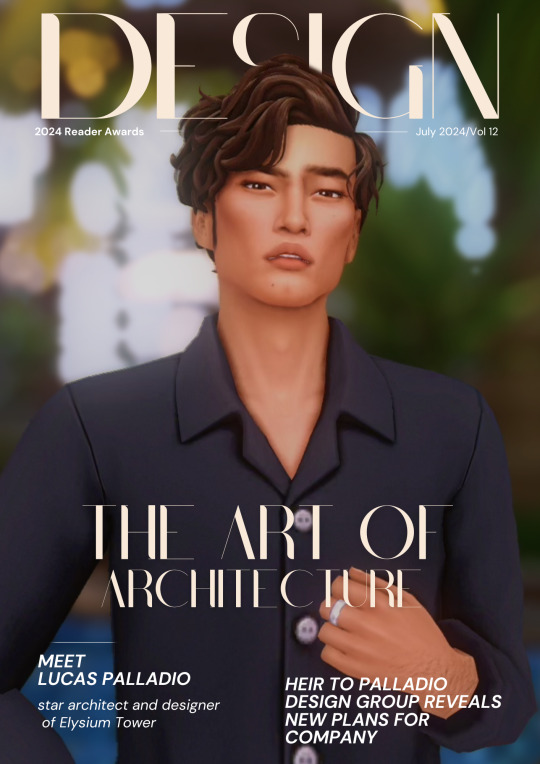
Lucas “Luca” Palladio for Penny’s BC by @bunnithechubs
“Designing dreams is my business. Will you be my next masterpiece?”
traits: self-absorbed, creative, ambitious
aspiration: serial romantic
career: luxury architect & designer
Lucas specializes in designing exclusive, high-end homes and spaces for elite clients, blending architecture with bespoke interior design. Known for his meticulous attention to detail and ability to bring a client’s most ambitious dreams to life, he’s built a reputation in elite circles. He’s worked with celebrities, CEOs, and international clients, making him a sought-after name in luxury architecture.
A recent breakup with model, Dina Caliente, shook him, though he’ll never admit it. It made him realize that, beneath his flashy exterior, he craves something real but doesn’t know how to get it. He’s entering the bachelor contest for Penny partly to show off but also because he sees her as someone who could challenge him and help him break out of his shallow patterns.
Read more about Luca’s backstory/personality below:


Backstory | Lucas “Luca” Palladio is a luxury architect with roots deeply planted in two cultures. His father, a successful diplomat from Tartosa, instilled in him a love for artistry and elegance, while his mother, an interior designer from Mt. Komorebi, introduced him to the principles of harmony and balance in design.
Luca grew up in a family where success and appearances meant everything. He was raised to believe that image and charm could get him anywhere, and it has—sort of. He’s charming, well-dressed, and knows how to work a crowd, but despite his success, Luca feels a void that material wealth can’t fill, though you won’t catch him admitting it.
Personality | Luca is charming, but he can be controlling and has a tendency to get possessive when things don’t go his way. He’s used to getting what he wants and has a bit of a temper, though he’s careful to hide it in public. Deep down, he’s vulnerable, carrying insecurities he masks with bravado. He feels pressured to keep up his polished image.
His work demands a high degree of control and precision, which bleeds into his personal life. Luca has a clear vision of how things should be, and he struggles when things don’t align with his expectations. He sometimes sees relationships as projects that need to meet his standards, which could lead to possessive or controlling tendencies. However, his career also hints at a hidden vulnerability: behind the polished exterior, he’s terrified of things falling apart, as failure is something he can’t easily handle.
Although he can be overbearing, Luca is also driven by a genuine desire to create beauty and leave a mark on the world. Deep down, he wants to be valued for who he is, not just what he creates, even if he’s unsure how to show that vulnerability. If he can learn to let go of his rigid expectations and trust in others, there’s potential for him to become a more genuine and supportive partner.
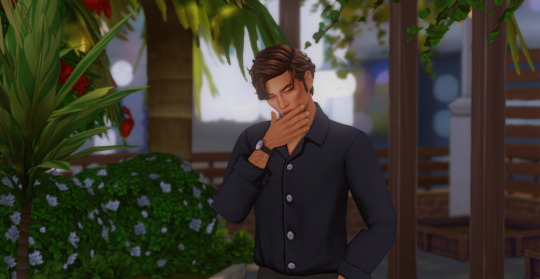

#sims 4#coastal cowplant#simblr#the sims 4#the sims community#ts4#ts4 simbrl#sims 4 screenshots#sims4#ts4 sims#coastal cowplant sims#the sims#sims#pennys bc#sims 4 maxis match#the sims 4 simblr#ts4 simblr#ts4 cas#ts4 story#palladio
57 notes
·
View notes
Text
A long trip on an American highway in the summer of 2024 leaves the impression that two kinds of billboards now have near-monopoly rule over our roads. On one side, the billboards, gravely black-and-white and soberly reassuring, advertise cancer centers. (“We treat every type of cancer, including the most important one: yours”; “Beat 3 Brain Tumors. At 57, I gave birth, again.”) On the other side, brightly colored and deliberately clownish billboards advertise malpractice and personal-injury lawyers, with phone numbers emblazoned in giant type and the lawyers wearing superhero costumes or intimidating glares, staring down at the highway as they promise to do to juries.
A new Tocqueville considering the landscape would be certain that all Americans do is get sick and sue each other. We ask doctors to cure us of incurable illnesses, and we ask lawyers to take on the doctors who haven’t. We are frightened and we are angry; we look to expert intervention for the fears, and to comic but effective-seeming figures for retaliation against the experts who disappoint us.
Much of this is distinctly American—the idea that cancer-treatment centers would be in competitive relationships with one another, and so need to advertise, would be as unimaginable in any other industrialized country as the idea that the best way to adjudicate responsibility for a car accident is through aggressive lawsuits. Both reflect national beliefs: in competition, however unreal, and in the assignment of blame, however misplaced. We want to think that, if we haven’t fully enjoyed our birthright of plenty and prosperity, a nameable villain is at fault.
To grasp what is at stake in this strangest of political seasons, it helps to define the space in which the contest is taking place. We may be standing on the edge of an abyss, and yet nothing is wrong, in the expected way of countries on the brink of apocalypse. The country is not convulsed with riots, hyperinflation, or mass immiseration. What we have is a sort of phony war—a drôle de guerre, a sitzkrieg—with the vehemence of conflict mainly confined to what we might call the cultural space.
These days, everybody talks about spaces: the “gastronomic space,” the “podcast space,” even, on N.F.L. podcasts, the “analytic space.” Derived from some combination of sociology and interior design, the word has elbowed aside terms like “field” or “conversation,” perhaps because it’s even more expansive. The “space” of a national election is, for that reason, never self-evident; we’ve always searched for clues.
And so William Dean Howells began his 1860 campaign biography of Abraham Lincoln by mocking the search for a Revolutionary pedigree for Presidential candidates and situating Lincoln in the antislavery West, in contrast to the resigned and too-knowing East. North vs. South may have defined the frame of the approaching war, but Howells was prescient in identifying East vs. West as another critical electoral space. This opposition would prove crucial—first, to the war, with the triumph of the Westerner Ulysses S. Grant over the well-bred Eastern generals, and then to the rejuvenation of the Democratic Party, drawing on free-silver populism and an appeal to the values of the resource-extracting, expansionist West above those of the industrialized, centralized East.
A century later, the press thought that the big issues in the race between Richard Nixon and John F. Kennedy were Quemoy and Matsu (two tiny Taiwan Strait islands, claimed by both China and Taiwan), the downed U-2, the missile gap, and other much debated Cold War obsessions. But Norman Mailer, in what may be the best thing he ever wrote, saw the space as marked by the rise of movie-star politics—the image-based contests that, from J.F.K. to Ronald Reagan, would dominate American life. In “Superman Comes to the Supermarket,” published in Esquire, Mailer revealed that a campaign that looked at first glance like the usual black-and-white wire-service photography of the first half of the twentieth century was really the beginning of our Day-Glo-colored Pop-art turn.
And our own electoral space? We hear about the overlooked vs. the élite, the rural vs. the urban, the coastal vs. the flyover, the aged vs. the young—about the dispossessed vs. the beneficiaries of global neoliberalism. Upon closer examination, however, these binaries blur. Support for populist nativism doesn’t track neatly with economic disadvantage. Some of Donald Trump’s keenest supporters have boats as well as cars and are typically the wealthier citizens of poorer rural areas. His stock among billionaires remains high, and his surprising support among Gen Z males is something his campaign exploits with visits to podcasts that no non-Zoomer has ever heard of.
But polarized nations don’t actually polarize around fixed poles. Civil confrontations invariably cross classes and castes, bringing together people from radically different social cohorts while separating seemingly natural allies. The English Revolution of the seventeenth century, like the French one of the eighteenth, did not array worn-out aristocrats against an ascendant bourgeoisie or fierce-eyed sansculottes. There were, one might say, good people on both sides. Or, rather, there were individual aristocrats, merchants, and laborers choosing different sides in these prerevolutionary moments. No civil war takes place between classes; coalitions of many kinds square off against one another.
In part, that’s because there’s no straightforward way of defining our “interests.” It’s in the interest of Silicon Valley entrepreneurs to have big tax cuts; in the longer term, it’s also in their interest to have honest rule-of-law government that isn’t in thrall to guilds or patrons—to be able to float new ideas without paying baksheesh to politicians or having to worry about falling out of sixth-floor windows. “Interests” fail as an explanatory principle.
Does talk of values and ideas get us closer? A central story of American public life during the past three or four decades is (as this writer has noted) that liberals have wanted political victories while reliably securing only cultural victories, even as conservatives, wanting cultural victories, get only political ones. Right-wing Presidents and legislatures are elected, even as one barrier after another has fallen on the traditionalist front of manners and mores. Consider the widespread acceptance of same-sex marriage. A social transformation once so seemingly untenable that even Barack Obama said he was against it, in his first campaign for President, became an uncontroversial rite within scarcely more than a decade.
Right-wing political power has, over the past half century, turned out to have almost no ability to stave off progressive social change: Nixon took the White House in a landslide while Norman Lear took the airwaves in a ratings sweep. And so a kind of permanent paralysis has set in. The right has kept electing politicians who’ve said, “Enough! No more ‘Anything goes’!”—and anything has kept going. No matter how many right-wing politicians came to power, no matter how many right-wing judges were appointed, conservatives decided that the entire culture was rigged against them.
On the left, the failure of cultural power to produce political change tends to lead to a doubling down on the cultural side, so that wholesome college campuses can seem the last redoubt of Red Guard attitudes, though not, to be sure, of Red Guard authority. On the right, the failure of political power to produce cultural change tends to lead to a doubling down on the political side in a way that turns politics into cultural theatre. Having lost the actual stages, conservatives yearn to enact a show in which their adversaries are rendered humiliated and powerless, just as they have felt humiliated and powerless. When an intolerable contradiction is allowed to exist for long enough, it produces a Trump.
As much as television was the essential medium of a dozen bygone Presidential campaigns (not to mention the medium that made Trump a star), the podcast has become the essential medium of this one. For people under forty, the form—typically long-winded and shapeless—is as tangibly present as Walter Cronkite’s tightly scripted half-hour news show was fifty years ago, though the D.I.Y. nature of most podcasts, and the premium on host-read advertisements, makes for abrupt tonal changes as startling as those of the highway billboards.
On the enormously popular, liberal-minded “Pod Save America,” for instance, the hosts make no secret of their belief that the election is a test, as severe as any since the Civil War, of whether a government so conceived can long endure. Then they switch cheerfully to reading ads for Tommy John underwear (“with the supportive pouch”), for herbal hangover remedies, and for an app that promises to cancel all your excess streaming subscriptions, a peculiarly niche obsession (“I accidentally paid for Showtime twice!” “That’s bad!”). George Conway, the former Republican (and White House husband) turned leading anti-Trumper, states bleakly on his podcast for the Bulwark, the news-and-opinion site, that Trump’s whole purpose is to avoid imprisonment, a motivation that would disgrace the leader of any Third World country. Then he immediately leaps into offering—like an old-fashioned a.m.-radio host pushing Chock Full o’Nuts—testimonials for HexClad cookware, with charming self-deprecation about his own kitchen skills. How serious can the crisis be if cookware and boxers cohabit so cozily with the apocalypse?
And then there’s the galvanic space of social media. In the nineteen-seventies and eighties, we were told, by everyone from Jean Baudrillard to Daniel Boorstin, that television had reduced us to numbed observers of events no longer within our control. We had become spectators instead of citizens. In contrast, the arena of social media is that of action and engagement—and not merely engagement but enragement, with algorithms acting out addictively on tiny tablets. The aura of the Internet age is energized, passionate, and, above all, angry. The algorithms dictate regular mortar rounds of text messages that seem to come not from an eager politician but from an infuriated lover, in the manner of Glenn Close in “Fatal Attraction”: “Are you ignoring us?” “We’ve reached out to you PERSONALLY!” “This is the sixth time we’ve asked you!” At one level, we know they’re entirely impersonal, while, at another, we know that politicians wouldn’t do this unless it worked, and it works because, at still another level, we are incapable of knowing what we know; it doesn’t feel entirely impersonal. You can doomscroll your way to your doom. The democratic theorists of old longed for an activated citizenry; somehow they failed to recognize how easily citizens could be activated to oppose deliberative democracy.
If the cultural advantages of liberalism have given it a more pointed politics in places where politics lacks worldly consequences, its real-world politics can seem curiously blunted. Kamala Harris, like Joe Biden before her, is an utterly normal workaday politician of the kind we used to find in any functioning democracy—bending right, bending left, placating here and postponing confrontation there, glaring here and, yes, laughing there. Demographics aside, there is nothing exceptional about Harris, which is her virtue. Yet we live in exceptional times, and liberal proceduralists and institutionalists are so committed to procedures and institutions—to laws and their reasonable interpretation, to norms and their continuation—that they can be slow to grasp that the world around them has changed.
One can only imagine the fulminations that would have ensued in 2020 had the anti-democratic injustice of the Electoral College—which effectively amplifies the political power of rural areas at the expense of the country’s richest and most productive areas—tilted in the other direction. Indeed, before the 2000 election, when it appeared as if it might, Karl Rove and the George W. Bush campaign had a plan in place to challenge the results with a “grassroots” movement designed to short-circuit the Electoral College and make the popular-vote winner prevail. No Democrat even suggests such a thing now.
It’s almost as painful to see the impunity with which Supreme Court Justices have torched their institution’s legitimacy. One Justice has the upside-down flag of the insurrectionists flying on his property; another, married to a professional election denialist, enjoys undeclared largesse from a plutocrat. There is, apparently, little to be done, nor even any familiar language of protest to draw on. Prepared by experience to believe in institutions, mainstream liberals believe in their belief even as the institutions are degraded in front of their eyes.
In one respect, the space of politics in 2024 is transoceanic. The forms of Trumpism are mirrored in other countries. In the U.K., a similar wave engendered the catastrophe of Brexit; in France, it has brought an equally extreme right-wing party to the brink, though not to the seat, of power; in Italy, it elevated Matteo Salvini to national prominence and made Giorgia Meloni Prime Minister. In Sweden, an extreme-right group is claiming voters in numbers no one would ever have thought possible, while Canadian conservatives have taken a sharp turn toward the far right.
What all these currents have in common is an obsessive fear of immigration. Fear of the other still seems to be the primary mover of collective emotion. Even when it is utterly self-destructive—as in Britain, where the xenophobia of Brexit cut the U.K. off from traditional allies while increasing immigration from the Global South—the apprehension that “we” are being flooded by frightening foreigners works its malign magic.
It’s an old but persistent delusion that far-right nationalism is not rooted in the emotional needs of far-right nationalists but arises, instead, from the injustices of neoliberalism. And so many on the left insist that all those Trump voters are really Bernie Sanders voters who just haven’t had their consciousness raised yet. In fact, a similar constellation of populist figures has emerged, sharing platforms, plans, and ideologies, in countries where neoliberalism made little impact, and where a strong system of social welfare remains in place. If a broadened welfare state—national health insurance, stronger unions, higher minimum wages, and the rest—would cure the plague in the U.S., one would expect that countries with resilient welfare states would be immune from it. They are not.
Though Trump can be situated in a transoceanic space of populism, he isn’t a mere symptom of global trends: he is a singularly dangerous character, and the product of a specific cultural milieu. To be sure, much of New York has always been hostile to him, and eager to disown him; in a 1984 profile of him in GQ, Graydon Carter made the point that Trump was the only New Yorker who ever referred to Sixth Avenue as the “Avenue of the Americas.” Yet we’re part of Trump’s identity, as was made clear by his recent rally on Long Island—pointless as a matter of swing-state campaigning, but central to his self-definition. His belligerence could come directly from the two New York tabloid heroes of his formative years in the city: John Gotti, the gangster who led the Gambino crime family, and George Steinbrenner, the owner of the Yankees. When Trump came of age, Gotti was all over the front page of the tabloids, as “the Teflon Don,” and Steinbrenner was all over the back sports pages, as “the Boss.”
Steinbrenner was legendary for his middle-of-the-night phone calls, for his temper and combativeness. Like Trump, who theatricalized the activity, he had a reputation for ruthlessly firing people. (Gotti had his own way of doing that.) Steinbrenner was famous for having no loyalty to anyone. He mocked the very players he had acquired and created an atmosphere of absolute chaos. It used to be said that Steinbrenner reduced the once proud Yankees baseball culture to that of professional wrestling, and that arena is another Trumpian space. Pro wrestling is all about having contests that aren’t really contested—that are known to be “rigged,” to use a Trumpian word—and yet evoke genuine emotion in their audience.
At the same time, Trump has mastered the gangster’s technique of accusing others of crimes he has committed. The agents listening to the Gotti wiretap were mystified when he claimed innocence of the just-committed murder of Big Paul Castellano, conjecturing, in apparent seclusion with his soldiers, about who else might have done it: “Whoever killed this cocksucker, probably the cops killed this Paul.” Denying having someone whacked even in the presence of those who were with you when you whacked him was a capo’s signature move.
Marrying the American paranoid style to the more recent cult of the image, Trump can draw on the manner of the tabloid star and show that his is a game, a show, not to be taken quite seriously while still being serious in actually inciting violent insurrections and planning to expel millions of helpless immigrants. Self-defined as a showman, he can say anything and simultaneously drain it of content, just as Gotti, knowing that he had killed Castellano, thought it credible to deny it—not within his conscience, which did not exist, but within an imaginary courtroom. Trump evidently learned that, in the realm of national politics, you could push the boundaries of publicity and tabloid invective far further than they had ever been pushed.
Trump’s ability to be both joking and severe at the same time is what gives him his power and his immunity. This power extends even to something as unprecedented as the assault on the U.S. Capitol. Trump demanded violence (“If you don’t fight like hell, you’re not going to have a country anymore”) but stuck in three words, “peacefully and patriotically,” that, however hollow, were meant to immunize him, Gotti-style. They were, so to speak, meant for the cops on the wiretap. Trump’s resilience is not, as we would like to tell our children about resilience, a function of his character. It’s a function of his not having one.
Just as Trump’s support cuts across the usual divisions, so, too, does a divide among his opponents—between the maximizers, who think that Trump is a unique threat to liberal democracy, and the minimizers, who think that he is merely the kind of clown a democracy is bound to throw up from time to time. The minimizers (who can be found among both Marxist Jacobin contributors and Never Trump National Review conservatives) will say that Trump has crossed the wires of culture and politics in a way that opportunistically responds to the previous paralysis, but that this merely places him in an American tradition. Democracy depends on the idea that the socially unacceptable might become acceptable. Andrew Jackson campaigned on similar themes with a similar manner—and was every bit as ignorant and every bit as unaware as Trump. (And his campaigns of slaughter against Indigenous people really were genocidal.) Trump’s politics may be ugly, foolish, and vain, but ours is often an ugly, undereducated, and vain country. Democracy is meant to be a mirror; it shows what it shows.
Indeed, America’s recent history has shown that politics is a trailing indicator of cultural change, and that one generation’s most vulgar entertainment becomes the next generation’s accepted style of political argument. David S. Reynolds, in his biography of Lincoln, reflects on how the new urban love of weird spectacle in the mid-nineteenth century was something Lincoln welcomed. P. T. Barnum’s genius lay in taking circus grotesques and making them exemplary Americans: the tiny General Tom Thumb was a hero, not a freak. Lincoln saw that it cost him nothing to be an American spectacle in a climate of sensation; he even hosted a reception at the White House for Tom Thumb and his wife—as much a violation of the decorum of the Founding Fathers as Trump’s investment in Hulk Hogan at the Republican Convention. Lincoln understood the Barnum side of American life, just as Trump understands its W.W.E. side.
And so, the minimizers say, taking Trump seriously as a threat to democracy in America is like taking Roman Reigns seriously as a threat to fair play in sports. Trump is an entertainer. The only thing he really wants are ratings. When opposing abortion was necessary to his electoral coalition, he opposed it—but then, when that was creating ratings trouble in other households, he sent signals that he wasn’t exactly opposed to it. When Project 2025, which he vaguely set in motion and claims never to have read, threatened his ratings, he repudiated it. The one continuity is his thirst for popularity, which is, in a sense, our own. He rows furiously away from any threatening waterfall back to the center of the river—including on Obamacare. And, the minimizers say, in the end, he did leave the White House peacefully, if gracelessly.
In any case, the panic is hardly unique to Trump. Reagan, too, was vilified and feared in his day, seen as the reductio ad absurdum of the culture of the image, an automaton projecting his controllers’ authoritarian impulses. Nixon was the subject of a savage satire by Philip Roth that ended with him running against the Devil for the Presidency of Hell. The minimizers tell us that liberals overreact in real time, write revisionist history when it’s over, and never see the difference between their stories.
The maximizers regard the minimizers’ case as wishful thinking buoyed up by surreptitious resentments, a refusal to concede anything to those we hate even if it means accepting someone we despise. Maximizers who call Trump a fascist are dismissed by the minimizers as either engaging in name-calling or forcing a facile parallel. Yet the parallel isn’t meant to be historically absolute; it is meant to be, as it were, oncologically acute. A freckle is not the same as a melanoma; nor is a Stage I melanoma the same as the Stage IV kind. But a skilled reader of lesions can sense which is which and predict the potential course if untreated. Trumpism is a cancerous phenomenon. Treated with surgery once, it now threatens to come back in a more aggressive form, subject neither to the radiation of “guardrails” nor to the chemo of “constraints.” It may well rage out of control and kill its host.
And so the maximalist case is made up not of alarmist fantasies, then, but of dulled diagnostic fact, duly registered. Think hard about the probable consequences of a second Trump Administration—about the things he has promised to do and can do, the things that the hard-core group of rancidly discontented figures (as usual with authoritarians, more committed than he is to an ideology) who surround him wants him to do and can do. Having lost the popular vote, as he surely will, he will not speak up to reconcile “all Americans.” He will insist that he won the popular vote, and by a landslide. He will pardon and then celebrate the January 6th insurrectionists, and thereby guarantee the existence of a paramilitary organization that’s capable of committing violence on his behalf without fear of consequences. He will, with an obedient Attorney General, begin prosecuting his political opponents; he was largely unsuccessful in his previous attempt only because the heads of two U.S. Attorneys’ offices, who are no longer there, refused to coöperate. When he begins to pressure CNN and ABC, and they, with all the vulnerabilities of large corporations, bend to his will, telling themselves that his is now the will of the people, what will we do to fend off the slow degradation of open debate?
Trump will certainly abandon Ukraine to Vladimir Putin and realign this country with dictatorships and against NATO and the democratic alliance of Europe. Above all, the spirit of vengeful reprisal is the totality of his beliefs—very much like the fascists of the twentieth century in being a man and a movement without any positive doctrine except revenge against his imagined enemies. And against this: What? Who? The spirit of resistance may prove too frail, and too exhausted, to rise again to the contest. Who can have confidence that a democracy could endure such a figure in absolute control and survive? An oncologist who, in the face of this much evidence, shrugged and proposed watchful waiting as the best therapy would not be an optimist. He would be guilty of gross malpractice. One of those personal-injury lawyers on the billboards would sue him, and win.
What any plausible explanation must confront is the fact that Trump is a distinctively vile human being and a spectacularly malignant political actor. In fables and fiction, in every Disney cartoon and Batman movie, we have no trouble recognizing and understanding the villains. They are embittered, canny, ludicrous in some ways and shrewd in others, their lives governed by envy and resentment, often rooted in the acts of people who’ve slighted them. (“They’ll never laugh at me again!”) They nonetheless have considerable charm and the ability to attract a cult following. This is Ursula, Hades, Scar—to go no further than the Disney canon. Extend it, if that seems too childlike, to the realms of Edmund in “King Lear” and Richard III: smart people, all, almost lovable in their self-recognition of their deviousness, but not people we ever want to see in power, for in power their imaginations become unimaginably deadly. Villains in fables are rarely grounded in any cause larger than their own grievances—they hate Snow White for being beautiful, resent Hercules for being strong and virtuous. Bane is blowing up Gotham because he feels misused, not because he truly has a better city in mind.
Trump is a villain. He would be a cartoon villain, if only this were a cartoon. Every time you try to give him a break—to grasp his charisma, historicize his ascent, sympathize with his admirers—the sinister truth asserts itself and can’t be squashed down. He will tell another lie so preposterous, or malign another shared decency so absolutely, or threaten violence so plausibly, or just engage in behavior so unhinged and hate-filled that you’ll recoil and rebound to your original terror at his return to power. One outrage succeeds another until we become exhausted and have to work hard even to remember the outrages of a few weeks past: the helicopter ride that never happened (but whose storytelling purpose was to demean Kamala Harris as a woman), or the cemetery visit that ended in a grotesque thumbs-up by a graveside (and whose symbolic purpose was to cynically enlist grieving parents on behalf of his contempt). No matter how deranged his behavior is, though, it does not seem to alter his good fortune.
Villainy inheres in individuals. There is certainly a far-right political space alive in the developed world, but none of its inhabitants—not Marine Le Pen or Giorgia Meloni or even Viktor Orbán—are remotely as reckless or as crazy as Trump. Our self-soothing habit of imagining that what has not yet happened cannot happen is the space in which Trump lives, just as comically deranged as he seems and still more dangerous than we know.
Nothing is ever entirely new, and the space between actual events and their disassociated representation is part of modernity. We live in that disassociated space. Generations of cultural critics have warned that we are lost in a labyrinth and cannot tell real things from illusion. Yet the familiar passage from peril to parody now happens almost simultaneously. Events remain piercingly actual and threatening in their effects on real people, while also being duplicated in a fictive system that shows and spoofs them at the same time. One side of the highway is all cancer; the other side all crazy. Their confoundment is our confusion.
It is telling that the most successful entertainments of our age are the dark comic-book movies—the Batman films and the X-Men and the Avengers and the rest of those cinematic universes. This cultural leviathan was launched by the discovery that these ridiculous comic-book figures, generations old, could now land only if treated seriously, with sombre backstories and true stakes. Our heroes tend to dullness; our villains, garishly painted monsters from the id, are the ones who fuel the franchise.
During the debate last month in Philadelphia, as Trump’s madness rose to a peak of raging lunacy—“They’re eating the dogs”; “He hates her!”—ABC, in its commercial breaks, cut to ads for “Joker: Folie à Deux,” the new Joaquin Phoenix movie, in which the crazed villain swirls and grins. It is a Gotham gone mad, and a Gotham, against all the settled rules of fable-making, without a Batman to come to the rescue. Shuttling between the comic-book villain and the grimacing, red-faced, and unhinged man who may be reëlected President in a few weeks, one struggled to distinguish our culture’s most extravagant imagination of derangement from the real thing. The space is that strange, and the stakes that high. ♦
63 notes
·
View notes
Text
Neo's Hecate = The Triple Goddess
Trivia is the Roman name of Hecate, Goddess of witchcraft, crossroads and ghosts. Neopolitan is Roman's Hecate, so her birth name is Trivia. Is that really all there is?

Obviously not. Or at least, Neo's allusion to Hecate can be read in multiple ways. Sure, it might have been an unplanned reference, but by this point (either willingly or not) Neopolitan has grown into Hecate's role. So, let's analyze ice-cream's girl allusion to better understand her story, with a focus on volume 9.
WHO IS HECATE?
Hecate is a Greek Goddes, who is later adopted by the Romans with the name of Trivia. Her origin is probably more ancient than Greek culture, though. In short, she is a foreign deity, who gets integrated into Greek religion. Similarly, Neopolitan is an unplanned character shoved into the narrative. However, she finds her place in the story and grows into herself.
Here are some of Hecate's most famous attributes.
Hecate is the Goddess of crossroads and magic. In particular, she is the master of darkness and the queen of ghosts to the point she is linked to nechromancy. She also rules over demons called Empusas, who are half woman and half beast (either a cow or a dog usually). They eat human blood and are linked to fire. Finally, Hecate is a psychopomp deity (like Hermes/Mercury), so she moves freely among Earth (human world), Olympus (world of the gods) and Hades (world of the deads).
Hecate is often depicted with three bodies and three heads:
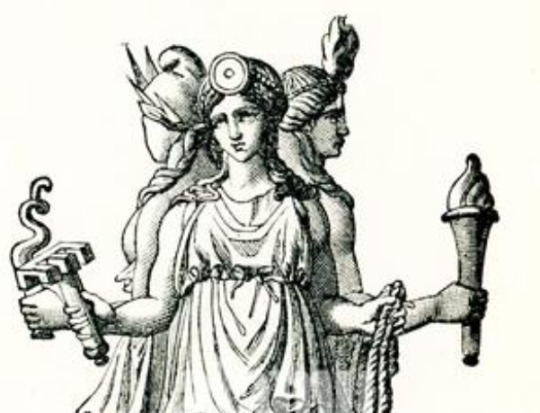
She holds torches and keys, which are symbolic of her ability to guide people in the underworld and to travel among dimensions. Sometimes, she can appear as a dog, which is her sacred animal.
Hecate is one of the Goddesses associated to the moon. In particular, she is the falling moon to Artemis's crescent moon and Selene's full moon. According to other traditions, she is a part of Artemis/Diana. This Goddess is the Moon in the Sky, Artemis on Earth and Hecate in the Underworld. Whatever the case, both Artemis and Hecate have a triple nature to them.
This triple nature makes Hecate an example of Triple Goddess in modern Neopagan religions. The Triple Goddess is the archetype of a female deity linked to the three phases of a woman's life. Youth (Maiden), Maturity (Mother) and Old Age (Crone). Her male counterpart is the Horned God.
As you see, Hecate is hard to define. Just like Neo. Both are ambiguous and difficult to grasp. Still, let's try to understand ice-cream girl better by using this mysterious Goddess. Let's focus on three things (obviously :P):
Hecate's link to the number 3 and how it is used in Neo's story
Hecate and Artemis's bond and how it mirrors Neo and Ruby's
Hecate's imagery and attributes and what they mean for Neo
The first is an analysis of Neo's interiority (microchosm). The second explains Neo's role in the story (macrochosm). The third offers a synthesis and a conclusion (balance).
RULE OF THREE (MICROCHOSM)
Hecate is known for her three heads and three bodies. Neo is a normal human, but the number 3 still comes up in her design:

Pink, white and brown. Strawberry, vanilla and chocolate. The three flavours of the Neapolitan ice cream. The three sides of Neo's self:
We are ruled by thirds. In fashion we compare no more than three colors. Our personalities are defined by the id, the ego and the super-ego- always warring vying for control. But our goal is harmony. Balance. (Roman Holiday, chapter 13)
According to Freud, the human mind is made of three parts. The id is where fear and wishes lie. It is a primitive and instinctive force. The superego is society’s expectations. It is where morality and ideals are. The ego is what balances the other two parts. It mediates between wishes and duties.
As per Roman Holiday, Neo is a combination of Neopolitan (pink), Vanille (white) and Trivia (brown). So, Neo's color scheme is a metaphorical representation of id, superego and ego:
Pink represents the id - Neopolitan is Trivia's pink imaginary friend. She embodies everything the child is forced to repress, like her pink eye and her wish for freedom.
White represents the superego - Vanille is Trivia's surname and a shade of white. The Vanilles want their daughter to fit into society and despise her disability, which makes her "odd".
Brown represents the ego - Trivia has brown hair, wears brown clothes and a brown contact lens. She is conflicted between her parents' expectations and her own wishes.
In her childhood, Trivia is unbalanced because her family forces her to repress her id. She cancels her pink side and projects it on her imaginary friend Neopolitan. So, Trivia undergoes a transformation and claims this part of herself back:
As the old saying went, “You can’t put the moon back together”. At times you had to destroy something to make something even better in its place. When Mama had shattered Neopolitan in front of their burning house, Trivia finally understood that she had been broken all along. Losing her friend was Trivia’s first step toward putting herself back together and embracing her true, best self. (Roman Holiday, chapter 11)
She re-arranges herself and her three parts:
Pink becomes the color of Neo's ego (her truest self). She stops hiding her eye and dyes half of her hair pink. Similarly, she embraces her Neopolitan persona more.
Brown becomes the color of the superego. It is a color linked to Neo's female authority figures like her mother (Carmel) and her teacher (Beatrix Browning). It is still present in Neo's color scheme, but much reduced. Similarly, Trivia is still there, but feels more like a mask than Neo's real self.
White becomes the color of the id. It is the color of Neo's family name, which she sheds. However, Neo still loves her parents, so her semblance dyes a lock of her hair white as an unconscious response to their death.
Roman Holiday is the story of Trivia Vanille's death and Neopolitan's birth:
As far as she was concerned, Trivia Vanille was buried under that mess, too. Neopolitan was the sole survivor. (Roman Holiday, chapter 26)
Neo leaves behind her parents and their strict rules to become a living manifestation of the id:
She just wanted to do whatever she wanted. And for the moment, what she wanted was to help Roman set the world on fire. (Roman Holiday, chapter 26)
Neopolitan does whatever she wants, even if it hurts others. She embraces her deepest wishes and chaotic emotions. This is the character we meet at the beginning of RWBY.
Well, Neo's arc in the series is to discard this person and to become someone new once again. After all, Neopolitan's name is linked to renewal and transformation. "Neopolitan" comes from Naples, which means "new city" (neo + polis). Naples's fantastic origin itself is a story of death and rebirth. According to the legend, this Italian city is born from a Siren, who dies for love. Her body transforms into the city and gives new life.
Similarly, Neo is a character able to be reborn countless times (neo = new + poly= many). So is Hecate, whose name may refer to the Greek number 100, as the Goddess is said to have one-hundred forms.
Our Neo/Hecate is then a multifaceted force, who goes through destruction just to embrace creation.
Neo's change in the series starts with a loss:
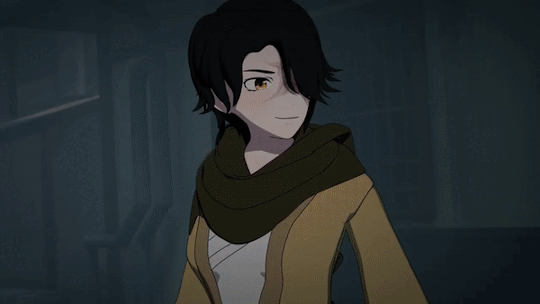
She loses both Roman and her inner balance:
There was one thing To help escape the misery And now it's all disarrayed You took my whole life away You sent me back to nothing Now you'll pay
So, she needs to rebuild herself once again:
We must live with balance But balance is blind (Lost her world) Vengeance is a riptide In a fairy tale, she'll find Inside A new me, I'm ready But who will I find? Inside I've gotta let go but could I lose my mind?
Volume 9 is where this inner transformation takes place. This time the new found harmony among id, superego and ego is not described by Neo's three colors. Rather, allusions are used.
In the Ever After, Neo is associated to three different Wonderland / Through the Looking Glass characters:
The Hatter, who represents the id
The Cheshire Cat, who represents the superego
The Jabberwocky, who represents the ego
THE HATTER - THE ID
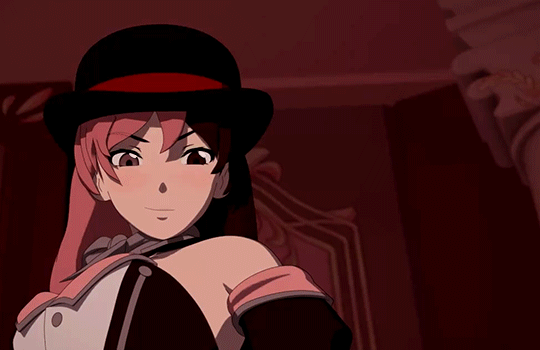
“Well, I'd hardly finished the first verse," said the Hatter, "when the Queen bawled out 'He's murdering the time! Off with his head!'" "How dreadfully savage!" exclaimed Alice. "and ever since that," the Hatter went on in a mournful tone, "he wo'n't do a thing I ask! It's always six o'clock now.”
The Hatter is a Wonderland and Through The Looking Glass character. He is famous for the Mad Tea Party, where he, the March Hare and the Dormouse chat with Alice. The original book reveals that the Hatter "killed time" while singing, so Time refuses to run normally for him and his friends. As a result, they are stuck in an eternal tea-party, as it is always tea-time for them. In the 1951 Disney movie, instead, he celebrates Alice's unbirthday.
Neopolitan has been stuck in time since Roman's death. She can't move on, so she focuses all her energies on revenge:
So close to closure The one thing you need Underneath a monument with a dedicated plea
Killing Ruby becomes Neo's One Thing to the point she organizes a special tea party of her own:
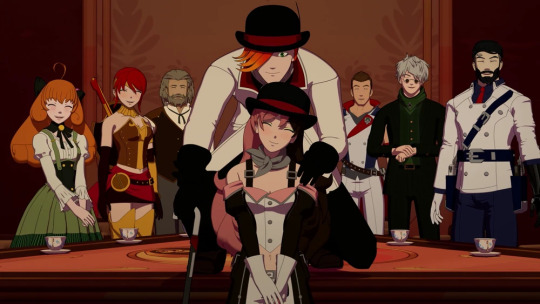
Ruby's unbirthday party, to be precise:
Cinder: And you… should have never been born…
Where she can dissolve Little Red in a cup, as if she were a sugar cube:
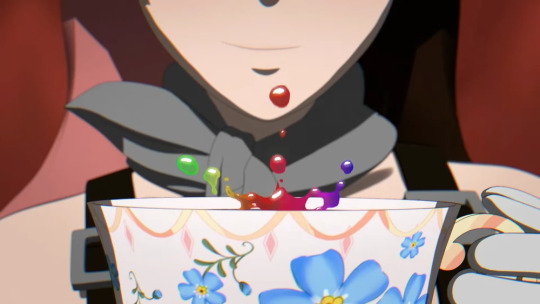
Kill for kill Eye for eye Blood for blood It's time to die Retribution tastes so sweet
The Hatter is a hostage in his tea party and Neo is a prisoner of her revenge. Both are consumed by their inability to go on. Both have killed time and can't face their future.
In Neo's case, the reason why she murders time is pretty clear. It is a coping mechanism to avoid grief:
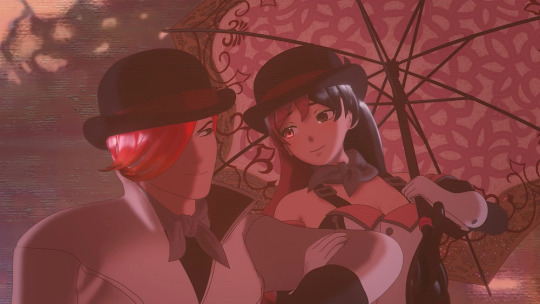
In Wonderland, the Hatter can drink tea at every hour. In her fantasy world, Neo can stay with Roman forever:
Neo-Roman: Y’know once Neo realized where she was, everything changed. Always loved the idea of a place to run away from it all. Do whatever you want. I offered that to her back on Remnant.
This is also why the first thing Neo does after landing in the Ever After is to evolve Overactive Imagination and to kill the Jabberwalker:
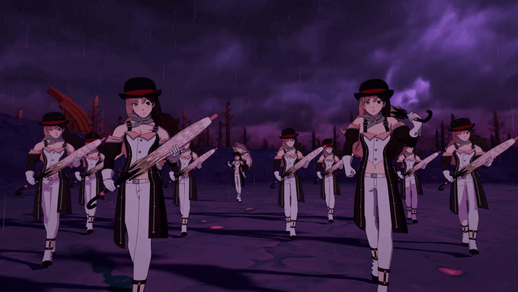
The creature is symbolic of death, as they kill Afterans permanently. So, Neo metaphorically negates her grief (the Jabberwalker) through illusions (her semblance).
At the same time, Neo enters the Ever After and gives in to her id. She has her desires and instincts control her completely. She loses all filters:
(Then suddenly) Scratched through the surface And you've found a key Unlocking what you thought was safe inside a box But it's somehow been set free (Finally)
Overactive Imagination's evolution is a physical representation of this psychological process. Neo spirals throughout Mistral and Atlas, but in volume 9 she hits rock bottom and stops acting rationally. She becomes the incarnation of her anger, which manifests through her semblance. Her illusions are typically silent. However, in the Ever After they speak, as Neo is letting her inner voices out of the box:
Say something real Do you only speak in riddles, chatterbox? I'm waiting for your ugly mouth to spit it out
This is why she becomes a chatterbox. She tries to communicate through her creations.
In particular, she makes an imaginary Roman (the Hatter), who looks and sounds like the real deal. He becomes the dominant voice in Neo's mind and speaks to and for her. His presence highlights Neo's inability to accept Roman's death. She hides in a lie. Just like Trivia used to cower behind her imaginary friend Neopolitan. As a child, Trivia can't accept Neo is a part of her. As an adult, Neo can't accept Roman isn't with her anymore. In this way, Neo's first real human connection gets reduced to an imaginary friend. This is the tragedy of Neo's adventure in the Ever After.
All happens because Neo surrenders herself to the id (her inner world). Still, it can't last forever. The id is a powerful source of energy and drive, but it is also destructive. So, Neo self-consumes until she has nothing left:
Neo-Roman: (voice in Neo’s head) You’ve finally done it! Little Red’s gone. With your Semblance stronger than ever now, we can take over this whole absurd place! Why not? Offing Little Red can’t be all you wanted… Right?
She puts so much into destroying Ruby, that she ends up empty. A vessel for others to take advantage of.
Curious Cat: You’ve lost something most important, haven’t you? And now you have nothing left. How delightful! An empty host, perfect for me to fill.
THE CHESHIRE CAT - THE SUPEREGO
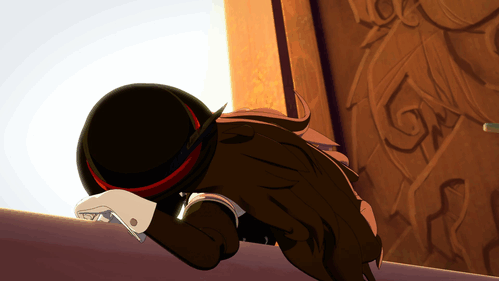
The Cheshire Cat appears twice in Alice's Adventures in Wonderland. The first time, he guides Alice at a crossroad and points her towards the March Hare's house. The second time, he appears at the Queen of Heart's croquet game as a giant head. The Queen and King are offended by his presence and want to behead him. Still, he is a head without a body, so the execution of this death sentence is complicated. Eventually, he simply fades away and disappears.
The character is inspired by the saying "grinning like a Cheshire Cat", whose origin is unknown. Among the many hypothesis, there is one about a grinning cat-shaped cheese. The cheese was cut from the tail, so that the last part eaten was the head of the smiling cat.
In RWBY, the character who alludes to the Cheshire Cat is not Neo, but the Curious Cat. Still, Neo and the Cat's stories are intertwined, as they destroy each other. The Cat possesses Neo and Neo kills the Cat.
Both characters eat and get eaten. They eat like the two wolves of Ruby's Little Red Riding Hood. They get eaten like the cat-shaped cheese, until only a floating head remains. A head separated from the body. A mind detached from reality:
“We’re all mad here. I’m mad. You’re mad.” “How do you know I’m mad?” said Alice. “You must be,” said the Cat, or you wouldn’t have come here.”
Neo and the Cat are mad, so they meet in the Ever After. However, their madnesses are opposite:
Neo loses herself in fantasy (the Ever After) and runs away from the real world (Remnant). She lets her unconscious feelings (id) run wild.
The Curious Cat is trapped in fantasy (the Ever After) and wants to reach the real world (Remnant). They are consumed by an imposed purpose (superego):
Curious Cat: I’m not like the other Afterans here, I’m cursed with curiosity. I need to know everything!
Blacksmith: A terrible thing to have a broken heart… And there’s nobody to send them (the Cat) back to the Tree for repair.
So, Neo and the Cat are foils, which is why they share the song Chatterbox. Both blabber non-stop. However, Neo's illusions speak her truest self. The Curious Cat instead uses smart words to hide their real intentions. Neo shows her inner beast (the shadow), while the Cat wears a mask (persona). So, Neo is the embodyment of the id and the Cat is her estranged superego. They are an external force, who comes and takes control of Neo's life:

The possession is a metaphor of Neo's state of mind. She goes from moving many characters around to becoming a controlled puppet. From shouting to radio silence. This switch is conveyed through the Curious Cat speaking through and for her.
This is Neo's nightmare, as her life is a struggle to be heard. Among other things, Neo refuses devices that make her sound robotic. She dislikes artificial voices because they sound fake to her. And yet, the Curious Cat forces Neo to speak their words. The Cat becomes Neo's new voice.
This is the result of Neo losing her inner drive:
NeoCat: She has no attachments to your world. Nothing to return to.
She is left with no wishes nor fears. She is a living id, who transforms into a walking superego. However, both extremes are wrong. A person is made of both her id and her superego. Both parts are needed to make an individual, which is why Neo is asked to face herself once more:
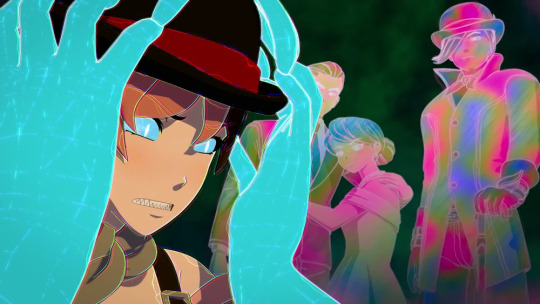
The Tree has the girl confront the pain and grief she has been ignoring. And yet, these feelings are what saves her:
NeoCat: No! These cracks, these feelings! I can’t… I can’t!!!
Thanks to them Neo gets back in control of her life. Symbolically, the Jabberwalker she kills in the beginning appears to finish the Cat off:

In this way, the cycle is complete and Neo's ego can finally surface.
JABBERWOCKY - THE EGO
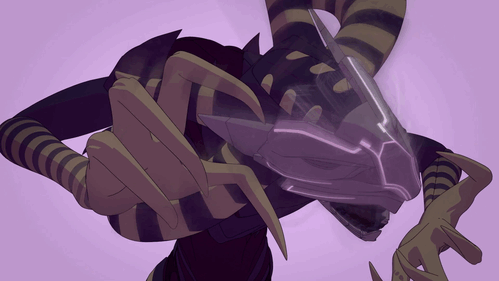
Beware the Jabberwock, my son! The jaws that bite, the claws that catch!
The Jabberwocky is a nonsense poem Alice finds in Through The Looking Glass. She initially can't read it, but then she realizes the verses are written in mirror-writing. She holds a mirror to the text and the poem appears. Despite being able to read it, though, Alice can't understand it:
"It seems very pretty," she said when she had finished it, "but it's rather hard to understand!" (You see she didn't like to confess, even to herself, that she couldn't make it out at all.) "Somehow it seems to fill my head with ideas—only I don't exactly know what they are! However, somebody killed something: that's clear, at any rate."
The poem conveys two main ideas:
It tells about a slaughter:
He took his vorpal sword in hand: Long time the manxome foe he sought— So rested he by the Tumtum tree, And stood awhile in thought. And as in uffish thought he stood, The Jabberwock, with eyes of flame, Came whiffling through the tulgey wood, And burbled as it came! One, two! One, two! And through and through The vorpal blade went snicker-snack! He left it dead, and with its head He went galumphing back.
It is impossible to understand, as it is full of gibberish and invented words
This is true for RWBY's Jabberwalker, as well:
They embody death, as Afterans killed by this creature are negated ascension
They jabber as they walk, which is why they fail to communicate with others
How does this relate to Neo? She kills the Jabberwalker, but assimilates them in her illusions. This happens because the creature is Neo's mirror. They reflect our Hecate in the making.
The Jabberwalker is a monster of grief who dies unheard:
Jabberwalker: Stop… It… Cease! No! NO! NOOOOOO!
Neo is a villain whose grief stays unrecognized:
Ruby: If you’re looking for an apology, you’ve wasted your time!
Not only by others, but by Neo too. She kills a part of herself in the Jabberwalker. Her most vulnerable and real part, that wants to communicate:
Say something real Do you only speak in riddles, chatterbox? I'm waiting for your ugly mouth to Say something real Do you only speak in riddles, chatterbox? I'm waiting on your ugly mouth to spit it out
She is a chatterbox that screams, but is not listened to. She can't talk, then she gains the ability to speak through her semblance. And yet, she can only be heard. Never understood. Similarly, Alice eventually learns how to read the Jabberwocky poem, but doesn't comprehend it.
This is why the Chatterbox song is so mysterious. Is it about Neo? The Cat? Both? Who sings what? Are they singing to each other? Or is it Ruby singing to them? It is impossible to say, just like it is impossible to grasp the full meaning of the Jabberwocky.
So, this song is about Neo and the Cat, but plays while RWBYJ fight the Jabberwalker. That is because the monster represents Neo's frammented self. They are the girl's ego, which is so broken and confused she herself negates it. Her journey in the Ever After, though, helps Neo find inner clarity:
(Waiting for it Sugar-coated All you need is here Come and find what Redefines you Make it crystal clear)
By the end she sees herself crystal clear:
Neo-Roman: To have what they have. What a thing, huh?
Her true wish is the same as ever. She wants a real connection. To succeed she has to let go of an imaginary one:
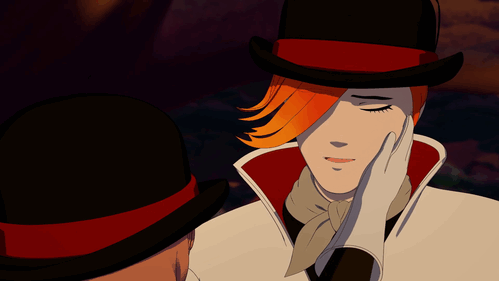
As a child, Trivia lets go of Neopolitan and finds Roman. As an adult, she lets go of Roman to find someone else. Trivia dies and Neo is born. Neo dies and someone new is born:
Blacksmith: She will have the chance to return her broken heart… And becomes something new. Such is balance.
Life from death. Creation from destruction. This is what transformation is. Symbolically, Neo kills all her three parts. She murders the Jabberwalker (ego), she rips the Curious Cat to shreds (superego) and finally releases Roman's illusion (id). Now, she is ready to move on.
HECATE AND ARTEMIS = SHADOW AND LIGHT (MACROCHOSM)

Hecate/Trivia and Artemis/Diana are two intertwined Goddesses. In particular, Hecate is sometimes described as a part of Artemis's triple identity. This Goddess is:
The Moon in the Sky (The Crescent Moon to be precise)
Artemis/Diana on Earth (Goddess of hunt)
Hecate/Trivia in the Underworld
Doesn't it remind you of anyone?

Ruby is
Associated with the Crescent Moon (Crescent Rose)
The best Huntress of all
A Red Grim Reaper with a Scythe
She is the Artemis (Crescent Moon) to Neo's Hecate (Falling Moon). This is why Neo's role in volume 9 is to play Ruby's Jungian Shadow:
In analytical psychology, the shadow is an unconscious aspect of the personality that does not correspond with the ego ideal, leading the ego to resist and project the shadow. In short, the shadow is the self's emotional blind spot, projected as archetypes.
The shadow is everything that is repressed or hidden. In Ruby's case that is her emotions over loss and grief. So, Neo becomes what links Ruby to these feelings of death. Just like Hecate/Trivia is the part of Artemis/Diana, who appears in the Underworld. This is why Neo and Ruby fall together in the Ever After.
During their fall, Neo transforms in three people Ruby cherishes: Oscar, Yang and Penny. What do they represent?
They are linked to future, present and past. In particular, Oscar is waiting for Ruby outside (future), Yang is in the Ever After with Ruby (present) and Penny is lost (past).
They are the three people Ruby's conflict is focused on in the Atlas Arc. In volume 7, Ruby disagrees with Oscar on telling Ironwood. In volume 8, Ruby and Yang fight over what to do. In volume 9, Ruby must overcome Penny's death.
These two meanings are linked to two roles Neo fulfills towards Ruby. That of Triple Goddess and that of Goddess of crossroads.
1- The idea of past, present and future ties into Hecate being a Triple Goddess:
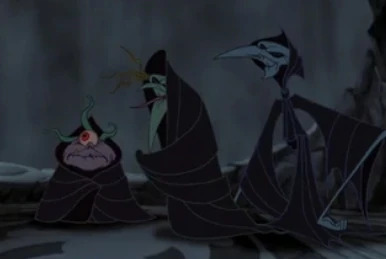
The fates are a representation of this Goddess and a declination of the Three Hecate Sisters, also known as Maiden, Mother and Crone. They are archetypes linked to three different phases of life. Youth, maturity and old age. In other words, past, present and future.
As Ruby's Hecate, Neo often brings up past, present and future throughout volume 9. Here is a quick list:
Ruby and Neo's fall in the Ever After (Penny is past, Yang is present and Oscar is future)
Ruby's first meeting with the Blacksmith, which is followed by the appearance of Neo's Jabberwalkers. There Ruby sees three weapons. Penny's sword is Ruby's inner child (past). Alyx's knife is the role Ruby is currently trying to fulfill (present). Summer's axe is who Ruby wishes to become (future)
Ruby's fight with Neo's Jabberwalker, where Ruby hallucinates three people. Cinder is the foe Ruby lost to (past). Penny is her current inner demon (present). Salem is the villain Ruby must eventually face (future)
Neo's crazy tea party, where Neo destroys Ruby by using three loved ones. Penny is a dead friend (past), Oscar is a friend Ruby could kill (future) and Little is a friend that dies (present)
Past, present and future haunt Ruby, so that she can accept who she was, understand who she is and move towards who she will be:
Past Ruby: So, are you a Huntress? Like the ones you read about in books? Ruby: I… I don’t know… Past Ruby: They always saved the day, didn’t they? Always knew what to do. Always won in the end. Ruby: But… life isn’t like a fairy tale… Past Ruby: That’s right! It’s up to you to make things better, isn’t it? Everything all depends on you! Your sister needs you, your friends need you, the whole world needs you to keep fighting, forever and ever, against an invincible monster that took your mother! Past Ruby: Mom was the best… but even she failed. That doesn’t seem fair. None of this seems fair. Ruby: But… What am I supposed to do…? Past Ruby: You can do whatever you want. Be whoever you want! You don’t even have to be Ruby Rose… So, what are you gonna be?
2- Neo brings to the surface Ruby's inner conflicts. She starts with the three struggles Ruby faces in Atlas and she keeps going by using her Jabberwalkers to re-create Atlas's destruction twice:

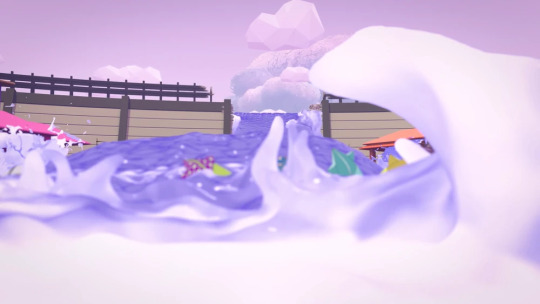
Finally, she has Ruby fight her inner demons all at once:
Neo-Ironwood: Who were you to think you knew what was best for Atlas? Neo-Pyrrha: I was the best and brightest Beacon had to offer. But I traded my life so my friends could live! Neo-Penny: Just like you were too late to save me at the Vytal Festival… I died in Atlas too, didn’t I? (walks towards Ruby) Can you imagine what that's like? To be completely and utterly failed… time and again… (kneels down to Ruby) by someone who meant the world to you… Neo-Pyrrha: How many more people are going to die because of you?! Ruby: I’m trying to save everyone! Neo-Ironwood: And yet with all your best intentions… Have you ever stopped to wonder if you’d done more harm than good?! Ruby: It’s not my fault…! Neo-Ozpin: How many more lives do you have to ruin before you realize you’re not cut out to save anyone?! Ruby: NO!!!
This happens because Neo is a manifestation of Ruby's id. Just like Hecate is a Goddess linked with crossroads and choice, Neo forces Ruby to transform.
Ruby's hidden self and her conflictual feelings are intertwined in Neo, who is the part of herself Ruby refuses to aknowledge until it explodes.
Let's juxtapose these two scenes:
Ruby: What is this about? The White Fang? Roman Torchwick?
Ruby: Is that seriously what this is all about? You still blame me for what happened to Torchwick?!
In volume 4, Ruby asks Tyrian why he is after her and mentions Torchwick. In volume 9, Ruby is surprised Roman's partner wants to avenge him. This happens because throughout Mistral and Atlas, Ruby starts shouldering too much responsibilities by herself. Her whole ego becomes intertwined with the duty to stop Salem. By doing so, she neglects other parts of the self:
Maria: You know, you don't give yourself enough credit. Ruby: Oh… Thanks. Maria: That wasn't a compliment.
Which leads to the shadow suffering and festering. Inside Ruby, the shadow is her grief and trauma. Outside, the shadow is Neo. A secondary villain with a revenge agenda, which is nothing compared to the threath Salem represents. And yet, Neo's personal grudge grows until she becomes dangerous for Ruby's own existence:
Neo-Roman: You don’t deserve to die, Red. You deserve to be broken down… Torn apart… wiped from existence.
In this context, Ruby refusing to empathize with Neo is really Ruby refusing to empathize with herself:
Give me anything But this symphony of technicolor rage You call it righteous, meaningful It's anything but love Don't take me for a fool I know this all too well so Leave your tears to someone else cuz It's not just you who lost it all
Neo kills the Jabberwalker because she doesn't want to accept Roman's loss. Ruby doesn't see Neo because it would mean to look at her own pain.
The end result is bad for both girls. On the one hand Ruby is overwhelmed by trauma and chooses to disappear. On the other hand Neo realizes how empty she is after Ruby is gone. That is because shadow and light can't live without each other. They need to integrate, which is what Ruby and Neo do by the end.
Both see themselves more clearly, so they are finally able to empathize with each other:


Their conflict almost kills them, but once they get throught it they are ready to become better versions of themselves. They die and are reborn:

Since she had used her Semblance for the first time to create a butterfly with one pink wing, one brown, with white spots all over- then sent it out her bedroom window and watched it flutter away until she lost sight of it and let it go. (Roman Holiday, chapter 11)
Like two butterflies, who step into a brand new phase of their lives.
HECATE (BALANCE)
Neo's story is about finding balance inside and outside:
Inside- As a child, Neo is too repressed (superego), so as an adult she becomes uncontrolled (id). Her arc has her grow more balanced (ego).
Outside - In volume 9, Neo is Ruby's shadow (id) and brings out all of Ruby's negative emotions. By the end, though, Ruby is able to understand Neo and feels sympathy for her. This is because our LRRH doesn't refuse her own shadow anymore.
In other words, Neo is an id character, who has to integrate both with herself and with the world around her. This fits Hecate, who is a Goddess linked to the Underworld. The Ever After itself is a representation of this kingdom for three different reasons:
It is the world before (under) Remnant
It is the world of the deads (buried under)
It is the world of the unconscious (buried inside)
This is why Neo's semblance grows more powerful while there. Hecate is the queen of ghosts and Neo grows powerful enough to rule the Ever After with her materialized spirits (illusions). On a deeper level, our lady of the deads must face her own grief. So, like other characters, Neo goes through the stages of grief. In particular, Neo's stages are represented by her reactions to different characters:
The Jabberwalker she kills (negation)
Ruby she stalks and tortures (rage)
The Roman she materializes (bargaining)
The Curious Cat she is controlled by (depression)
All these meetings are a part of her journey to find both acceptance and herself. Maybe this is why throughout volume 9 she progressively becomes more and more Hecate-like. As a matter of fact, she aquires many attributes of the mysterious Goddess.
She gains her personal Empusas:

The Empusas are Hecate's demons, who look like girls with some odd body parts. In this case, Neo's heterocromia.
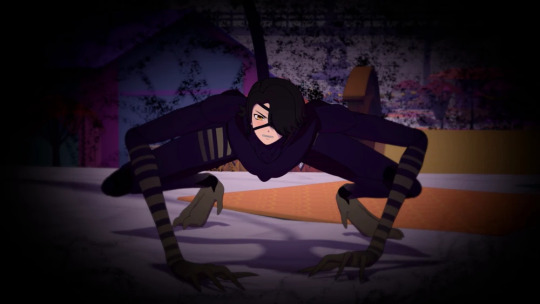
The Empusas are usually monsters linked to fire that appear as half-dogs. Here, Ruby sees the Jabberwalker with Cinder's head.
She finds her own Horned God:
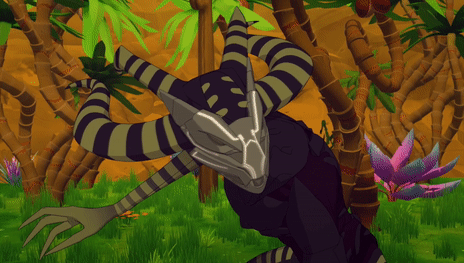
The Horned God is the Triple Goddess's companion in neopagan religions. The Jabberwalker is a horned creature associated with Neo.
She commands a pack of dogs (the Jabberwalkers) and she herself plays the part of Ruby's dangerous wolf. This fits with Hecate's sacred animals being dogs.
Finally, she stands beside a wicked torch:
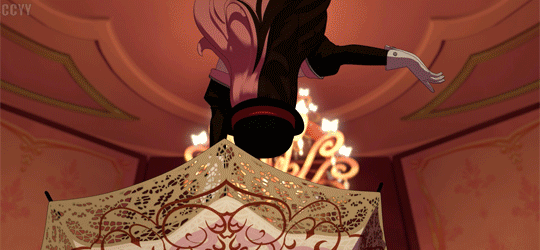
Torchwick-illusion is her companion in the Underworld and a symbol of her friend's lost soul. She even uses Roman's voice to lead Ruby towards death. Just like Hecate holds torches to guide mortals in the Kingdom of the Deads.
Despite all this, there is still an attribute missing: keys. They represent Hecate's ability to travel through worlds. However, Neo is stuck in the Ever After:
Jaune: So Neo can’t go through the door…
This happens because she has still to fully bloom into Hecate (herself). However, she is making progress and by the end of volume 9 she reaches acceptance. A necessary step to grow.
In particular, she dispels her illusion of Roman. She overcomes her grief by overcoming her own fantasies. This is interesting because it is the opposite of what happens in Roman Holiday:
“He caught a lock of her hair and showed it to her. It was white. “This is new. It suits you,” he said. Why would she have done that with her Semblance?” (Roman Holiday, chapter 26)
There, she represses her sadness over her parents' death, which manifests in her illusory white lock of hair. In the series, though, she lets go of an illusion to move on. Why is that so? That is because Neo herself is a combination of illusion and reality:
“Roman shook his head. “Show them who you really are.” Neo changed back into herself, but swapper her school uniform for her favourite suite. Roman handed her her parasol. (Roman Holiday, chapter 22)
Roman Holiday is the story of how she realizes illusions are a part of who she is. Volume 9 is where she learns she can't live in a world made only of illusions. So, she chooses to face herself for real:
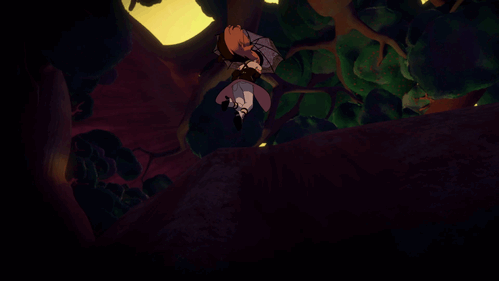
Once she emerges from the Tree, she will gain her allusion's ability to move freely between dimensions (psychopomp) and will go through the door. She will leave her fantastical world (the Ever After) and come back to reality (Remnant).
#rwby#rwby volume 9#rwby meta#neopolitan#neopolitan (rwby)#neo rwby#ruby rose#roman torchwick#curious cat#jabberwalker#once upon an allusion#my meta
242 notes
·
View notes
Text
Trump Won. Now What?
The United States is about to become a different kind of country.By David Frum
Donald Trump has won, and will become president for the second time. Those who voted for him will now celebrate their victory. The rest of us need to prepare to live in a different America: a country where millions of our fellow citizens voted for a president who knowingly promotes hatred and division; who lies—blatantly, shamelessly—every time he appears in public; who plotted to overturn an election in 2020 and, had he not won, was planning to try again in 2024.
Above all, we must learn to live in an America where an overwhelming number of our fellow citizens have chosen a president who holds the most fundamental values and traditions of our democracy, our Constitution, even our military in contempt. Over the past decade, opinion polls have showed Americans’ faith in their institutions waning. But no opinion poll could make this shift in values any clearer than this vote. As a result of this election, the United States will become a different kind of country.
When he was last in the White House, the president-elect ignored ethics and security guidelines, fired inspectors general and other watchdogs, leaked classified information, and used the Department of Homeland Security in the summer of 2020 as if it were the interior ministry of an authoritarian state, deploying U.S. Customs and Border Protection and Coast Guard “troops” in American cities. Trump actively encouraged the January 6, 2021, insurrection at our Capitol. When he left the White House, he stole classified documents and hid them from the FBI.
Because a critical mass of Americans aren’t bothered by that list of transgressions, any one of which would have tanked the career of another politician, Trump and his vice president–elect, J. D. Vance, will now try to transform the federal government into a loyalty machine that serves the interests of himself and his cronies.
This was the essence of the Heritage Foundation’s Project 2025, and its architects, all Trump fans, will now endeavor to make it become reality. Trump will surely try again to dismantle America’s civil service, replacing qualified scientists and regulators with partisan operatives. His allies will help him build a Department of Justice that does not serve the Constitution, but instead focuses on harassing and punishing Trump’s enemies. Trump has spoken, in the past, of using the Federal Communications Commission and the Internal Revenue Service to punish media organizations and anyone else who crosses him, and now he will have the chance to try again.
Perhaps the greater and more insidious danger is not political repression or harassment, but corruption. Autocratic populists around the world—in Hungary, Turkey, Venezuela—have assaulted institutions designed to provide accountability and transparency in order to shift money and influence to their friends and families, and this may happen in America too. This is not just a theoretical threat. As loyalists take over regulatory agencies, filling not only political but also former civil-service jobs, American skies will become more polluted, American food more dangerous. As a result of this massive shift in the country’s bureaucratic culture, Trump-connected companies will prosper, even as America becomes less safe for consumers, for workers, for children, for all of us.
American foreign policy will also reflect this shift toward kleptocracy. In his first term, Trump abused the powers of his office, corrupting American foreign policy for his personal gain. He pressured the Ukrainian president to launch a fake investigation of his political opponent; altered policy toward Turkey, Qatar, and other nations in ways that suited his business interests; even used the Secret Service to funnel government money to his private properties. In a second term, he and the people around him will have every incentive to go much further. Expect them to use American foreign policy and military power to advance their personal and political goals.
There are many things a reelected President Trump cannot do. But there are some things he can do. One is to cut off aid to Ukraine. The Biden administration has three months to drop all half measures and rush supplies to Ukraine before Trump forces a Ukrainian surrender to Russia. If there’s anything in the American arsenal that Ukraine might successfully use—other than nuclear weapons—send it now, before it’s too late.
Another thing Trump can do is to impose further tariffs—and intensify a global trade war not only against China but also against former friends, partners, and allies. America First will be America Alone, no longer Ronald Reagan’s “city on a hill,” but now just another great power animated by predatory nationalism.
Around the world, illiberal politicians who seek to subvert their own democracies will follow America’s lead. With no fear of American criticism or reaction, expect harassment of press and political opponents in countries such as Mexico and Turkey to grow. Expect the Russian-backed electoral cheating recently on display in Georgia and Moldova to spread. Expect violent rhetoric in every democracy: If the American president can get away with it, others will conclude that they can too. The autocratic world, meanwhile, will celebrate the victory of someone whose disdain for the rule of law echoes and matches their own. They can assume that Trump and Vance will not promote human rights, will not care about international law, and will not reinforce our democratic alliances in Europe and Asia.
But the most difficult, most agonizing changes are the ones that will now take place deep inside our society. Radicalization of a part of the anti-Trump camp is inevitable, as people begin to understand that existential issues, such as climate change and gun violence, will not be tackled.
A parallel process will take place on the other side of the political spectrum, as right-wing militias, white supremacists, and QAnon cultists are reenergized by the election of the man whose behavior they have, over eight years, learned to imitate. The deep gaps within America will grow deeper. Politics will become even angrier. Trump won by creating division and hatred, and he will continue to do so throughout what is sure to be a stormy second term.
My generation was raised on the belief that America could always be counted upon to do the right thing, even if belatedly: reject the isolationism of America First and join the fight against Nazism; fund the Marshall Plan to stop communism; extend the promise of democracy to all people, without regard to race or sex. But maybe that belief was true only for a specific period, a unique moment. There were many chapters of history in which America did the wrong thing for years or decades. Maybe we are living through such a period now.
Or maybe the truth is that democracy is always a close-run thing, always in contention. If so, then we too must—as people in other failing democracies have learned to do—find new ways to champion wobbling institutions and threatened ideas. For supporters of the American experiment in liberal democracy, our only hope is education, organization, and the creation of a coalition of people dedicated to defending the spirit of the Constitution, the ideals of the Founders, the dream of freedom. More concretely: public civic-education campaigns to replace the lessons no longer taught in schools; teams of lawyers who can fight for the rule of law in courts; grassroots organizing, especially in rural and small-town America; citizens and journalists working to expose and fight the enormous wave of kleptocracy and corruption that will now engulf our political system.
Many of those shattered by this result will be tempted to withdraw into passivity—or recoil into performative radicalism. Reject both. We should focus, instead, on how to win back to the cause of liberal democracy a sufficient number of those Americans who voted for a candidate who denigrated this nation’s institutions and ideals.
25 notes
·
View notes
Text
Riddle watches New Wish - Post #5
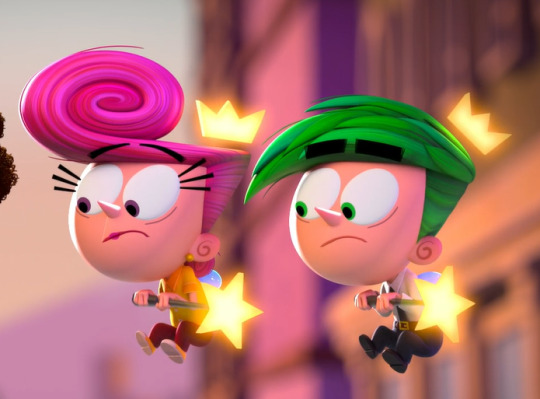
They're so cute...
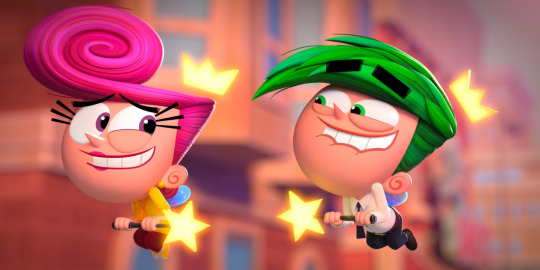
OH, she set them up!! Here we go!
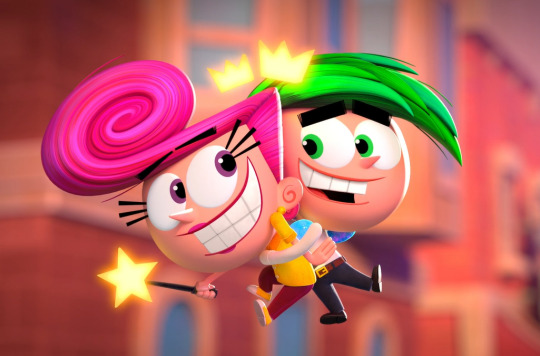
Wanda making squeaky toy noises when Cosmo hugs her is all I've ever wanted.
"We're real, all right! ... Real fairies. Not real humans."
BUDAWHAAAAAAAA-? Thank you Cosmo for just confirming elastic skin, which has been one of the most important headcanons in my worldbuilding. I did not expect you to do that for me, but... thanks?
Pfft, Wanda changing her legs.
ERG??? Is that you?
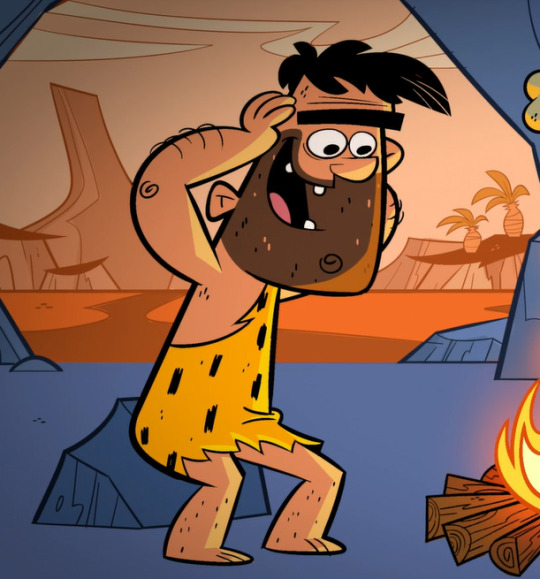
Okay, there's that "We've been retired for 10k years" implied time travel bit; I think I remember that from the story bible + early convos with my friends, so at least I came prepared to expect that.
This is either time travel - which plays perfectly into my established "Cosmo ate a time key during dinosaur times and has been running around through time unsupervised for ages" headcanon anyway, LOL - or they're flat-out lying to Hazel, seeing as the audience already knows Timmy is confirmed as a recent godkid, so... Hm.
SLDKFJSD I love how the guy who accidentally sent his baby stroller down a steep hill is wearing a #1 Dad hat. "My expensive stroller! ... I mean, my baby!" - Yeah, we're still in FOP. All the parents are terrible here.
Setting her up as loving french fries and then turning her into a fly who found french fries was clever.
Cosmo once again being so close and yet so far to his mark. Good to see him back!
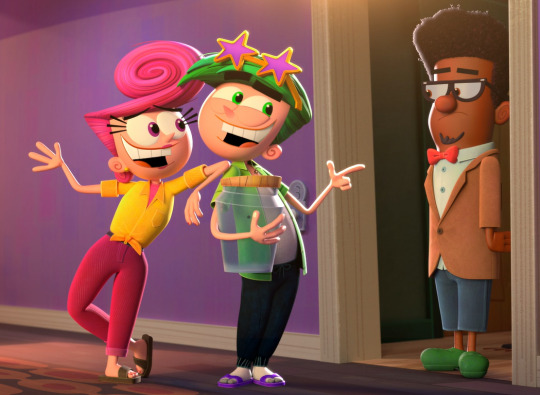
Me when I return my would-be murderer's daughter, who is a bug.
I AM SO GLAD that even in 10,000 years, Wanda's small talk skills have not improved far beyond "I'm Human McRealPerson" and "My husband is a grilled cheese sandwich" from back in the day, sdlkfj. That's my girl!
oh no, the Venus flytrap gift they brought over is about to go so wrong.
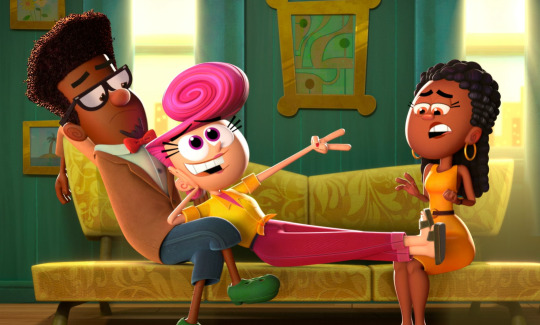
Yep, she's still goin'. Talking about the carwash.
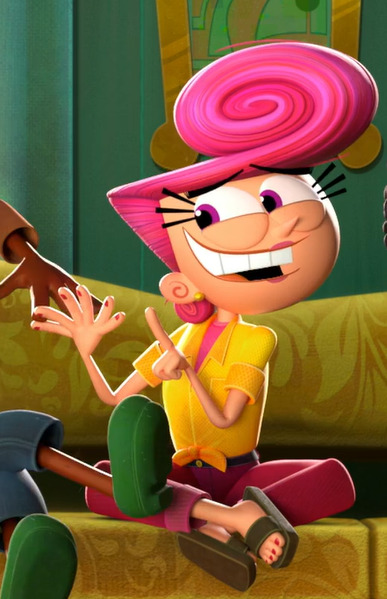
GIRL check your fingers.
OH MY GOSSSSSSH, he's dressed for a classy party in Fairy culture. Cosmorella? We thought you were dead!!
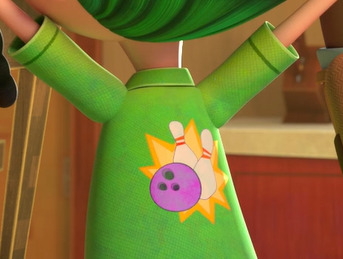
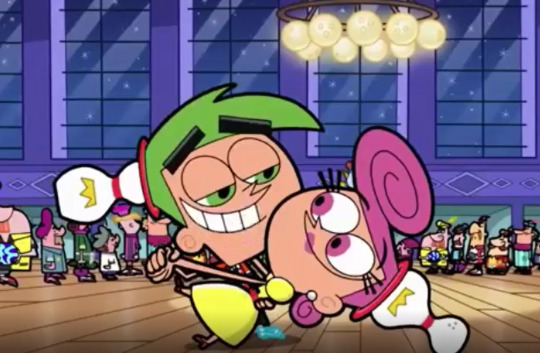
... That's an ant? I would've guessed tick.
It's a guy ant? Buddy, are you sure you're supposed to be foraging?
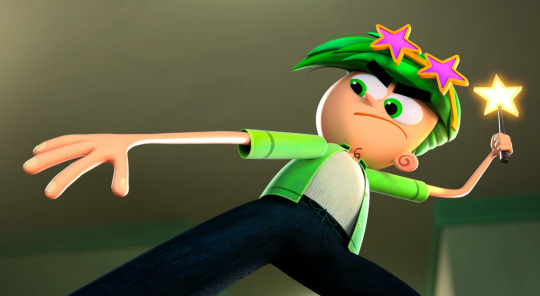
Let's go!!
SDLKFJSDKLFJSLKJF noooo... No, no, no, no, no... Not the thing I use to symbolize memorials for the dead, c'mon!
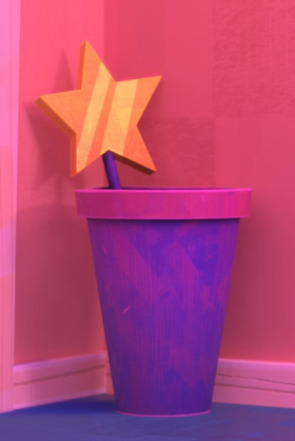
It IS an accurate item for a Fairy house- these were all over the place in Fairy World during the old show, AND in that color, though you usually see more than one "wand" per pot.
I'm super impressed the artists studied the old interior design customs. Huh.
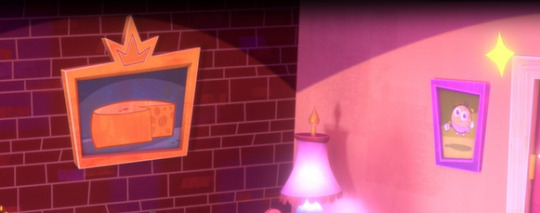
Cosmo lives here. Also, BABY!!
OOH, I'm excited that Cosmo and Wanda's window overlooks Fairy World because it's kind of a portal. I did something super similar with a rat cage in an upcoming Frayed Knots scene, where Anti-Cosmo and Wanda are godparenting together during school. Nifty!
He even confirmed it's a spell on the front door! Wow. Somehow, Past Me nailed that.
"We can choose which world we go out into!" -> /Me with my 'fic where Kevin Crocker is confused that Shirley's Pizza Parlor has an exit on the other side that goes to Retroville.
Cosmo: We lived in Timmy's fishbowl for 20 years. Wanda: It was 7.
You are both wrong- it was like 68 <3 But honestly, I forgive you for not wanting to tell Hazel time was frozen for 50 years. I don't think she'd like that. Actually, I don't think she was born yet, because my vision is time freezing at the end of Season 4, and Dale was rescued in Season 2, so... Yeah, she wasn't born. Still, you don't wanna just drop that on someone.
That's actually very funny that Cosmo and Wanda are struggling because they're out of practice during their retirement.
THERE'S THE SIGN!! Way to go.
Oh, and the credits are done in a similar style to the old ones? Even the colors? That's so cute! That's also nice that Hazel's VA was a story editor too- That probably helps with the passion and vision.
That was cute. I liked it. Huge relief to see something well-researched and made with love after "Fairly Odder" was a struggle for me.
I've got a little more time tonight, I might be able to get one more episode done before bedtime.
#Riddle watches FOP#New Wish spoilers#FAIRIES!#Pending Hazel tag#Dragonfly parents#screenshots#ridwriting#Frayed Knots
29 notes
·
View notes
Note
Honestly it seems like a fight to even have Billy's Romani heritage mentioned in the comics, even though he seems like the type to be really eager to learn about his cultural heritage. And it'd be a bonding activity that doesn't exclude Tommy, the way that something magically inclined most likely would.
On one hand, Pietro and Wanda being drawn with darker skin is a relatively recent development that still seems to be facing some pushback. On the other, I'd expect the lack of whitewashing to naturally apply to Luna, Billy, and Tommy as well? Even in the case of retro-reincarnation; if they're written and drawn as taking entirely after Wanda's family physically, instead of the Kaplans or Shepherds- that's what Heinberg and Cheung intended, it's how Magneto identified them as Wanda's kids, and everyone else has followed that trend- then I don't understand some people's logic behind that applying to everything EXCEPT skin tone.
To my understanding, making this sort of change to a character's official design requires a degree of editorial authority. Dauterman, Orlando, et al were able to do that for Wanda and Pietro because they had more direct control over them as title characters. They're making Speed or Wiccan comics, so they don't get to do official design sheets for Billy and Tommy. I'm sure that there were many other, more complicated conversations happening behind the scene, but I think that's the basic gist.
Having said that, there's really no reason they couldn't give Billy and Tommy darker skin, or just make them look more like Wanda, in Scarlet Witch, even if it wouldn't be reflected in other books. Artists get away with making arbitrary coloring choices all the time-- usually for the worse, but sometimes for the better. So, I think that they are making this visual distinction on purpose, and there's a couple reasons why that might be happening. A lot of people do arrive at the conclusion that Billy and Tommy should look more mixed, for lack of a better term, than Wanda because of their unconventional parentage. I don't love it, especially not when it means making them super pale, but I do understand the logic.
It's also completely possible that Orlando doesn't think or hasn't realized that Billy and Tommy are Romani, or have Roma heritage. Or perhaps he is just uncertain of what the best, most appropriate course to take, because it's an odd situation. This is why, even if he's not writing stories specifically about Wanda's race and culture, he'd benefit from a consultant or sensitivity reader.
I'd care a lot less about what these characters looked like, if I felt like the nuances of their heritage were authentically represented. I care about Wanda and Pietro being brown because there isn't enough inclusive representations of brown Roma, and because there is a gap in readers' understanding that Roma are a racial minority, so seeing us as people of color is necessary. If people had better understanding, or if there was a more inclusive range of characters, it wouldn't matter. Similarly, I want Billy and Tommy to look like Wanda because for some reason "Billy and Tommy are Wanda's kids" does not translate to "Billy and Tommy are Romani" in people's minds. If that was already a given, it would matter less.
Anyways, I've pointed this out before, but it does seem as if Dauterman may have changed Billy and Tommy's skin tone on his most recent covers. Its really hard to tell because of the lighting, but compared to last years #6, I feel like the base color here is closer to Wanda and Pietro's shade range.


Again, full aware that this is a stretch, but if you use Lorna as an example of how fair skin reflects in this sort of dramatic lighting, the tones used on Billy and Tommy are consistently deeper and warmer. I'm not making any assumptions, it's just something I noticed and it's made me very curious to see what the interiors will look like for SW #7.
20 notes
·
View notes
Text
It’s Disabled Billy and Steve Week
Day 1- Music
My prompt: Harringrove- Dancing to music at their wedding
-•-•-•-
In 1996, Billy and Steve get married.
They didn’t want to wait an unknown amount of time just for a legal certificate that wouldn’t mean much anyways, so they each picked a ring from one another’s jewelry boxes, bought some thrifted suit jackets, and set the date.
Mrs. Byers was more than happy to lend her back yard to the event, as long as her kids agreed to help her with the load of work setting up and decorating would create. They got help from their friends, and through the grapevine that led to Carol, a now professional interior designer, getting her hands on the theme and decorations. Control, drama, whatever, it’s all in Carol's wheelhouse, but Billy’s just grateful she involved Steve in choosing the theme.
Steve had had a stroke and lost 90% of his eyesight in the aftermath of the Starcourt attacks. In the years since it’s never returned, the old nurse's promises of magic recovery all hollow attempts at making him feel better, so it meant a lot when Carol went out of her way to get tactile decorations for Steve to enjoy in his own right.
Massive fake flowers, braille signs and table settings, even the cake is textured with sugar pearls and rolled chocolate to give Steve something to touch, a way to build his own image of his special day. The cake came courtesy of Jonathan and Tommy, a more than unlikely duo who came together for their friends, and because of their mutual artistic interests.
Nobody expected Tommy to become a baker of all things, but damn if he doesn’t make the best tres leches cake any of them had ever tried. Though to be fair, the majority of their Midwestern friend group couldn’t say they had tried one before. Argyle and Billy had bragging rights on culinary experiences growing up in a more culturally diverse region.
Jonathan on the other hand had become a painter, and done the decorations for Tommy’s cake. After all the monster encounters, flashing lights and loud sounds weren’t really his thing. Photography just wasn’t his passion anymore. Art was still a big interest of his though, and it was actually Heather who introduced painting, since she took lessons as a little kid.
Heather, who is the stand-in bridezilla. Both Billy and Steve are calm about their wedding, caring more about what it means to each other than the actual event. That isn’t that case for miss Heather Ernestine Holloway-Buckley. She wants everything to be perfect. Absolutely. Everything.
From the tablecloths being the same color as Billy’s white and gold suit jacket, to the flower petals scattered in the neatly trimmed grass matching the crown of flowers in Steve’s hair. She demands everyone get matching dresses or suits depending on their preference, so the pictures will turn out perfect. In Jonathan’s place, El takes the photos, taught by her older brother about the craft and determined to capture as many memories as possible.
The rest of the smaller details are kept secret from the boys. Things like who will officiate, the food, how the backyard will be set up, and the music are all a total surprise to keep things exciting.
With everything in place, all they need is to be there. To say their vows and dedicate the rest of their lives to the one they consider their soulmate.
But Steve is terrified. Having nightmares every night leading up to the wedding because he’s scared his blindness is going to ruin something. Even Robin, who has been with him every step of the way, has been warning him numerous times to be careful on that night.
The wedding will be by daylight, made even brighter by small candles on the tables, and fairy lights strung in the trees, but that only means Steve can see basic, blurry silhouettes. If he trips, or runs into something, or someone, on his wedding day, he’ll never live down the embarrassment.
There’s only one day left until the ceremony when he brings it up to Billy, trying to be subtle about it and failing hugely.
At the breakfast table, over pre-game chocolate chip pancakes as Billy called them, Steve asks him, “Are you nervous?”
Even at this stage, Billy gets grumpy in the mornings. He cooked breakfast, sure, but he might as well still be asleep until noon. Usually, thanks to his pain meds, he might take a few half hour power naps up until then. Still, his answer and its gravelly delivery are playful and unserious, “Nah. I’m just eager for the honeymoon stage.”
Only, Steve’s nerves are so wound up, he can’t find it charming like usual. A simple, quiet, “Oh.” is his only response.
Right away, he can tell from the shift in his partner's energy that Billy knows what that means. Some part of Steve is glad he can’t look into Billy’s face and see the pain in his features, from knowing Steve isn’t perfectly alright.
That’s something Steve forgets sometimes, that just because he can’t see someone, doesn’t mean they can’t see him. Every emotion he feels is expressed freely in the look on his face, revealing the anxiety, and the bubbling uncertainty that makes this so hard.
Billy encourages him to talk about it, “Come on, Stevie. Spill. What’s goin’ on in that head of yours?”
Something tells Steve to lie. Maybe it’s the pressure of the wedding being just a little over twenty four hours away at this point. Probably that. His entire life he grew up thinking there was nothing more important than marriage, and now that he has the chance, he’s terrified of things going poorly. So he assures Billy, “Nothing! I get to marry you! What could be wrong?”
“Darling. I see those gears turning. You’re thinking something.” Billy sees through it. Of course he does or he wouldn’t have ever broken down Steve’s mask personality enough to one day become his husband. Billy must worry that he hasn’t done exactly that, because he asks, softer and more quivery than his other words, “Getting cold feet?”
“No! Oh, god Billy no. Never ever.” Steve promises passionately, reaching over to the spot where Billy is for his hand, the responsibility of actually placing their hands together and sharing touch placed onto Billy. Squeezing it gently so he knows he feels him, Steve tries to explain his feelings, “I just. I feel wiggly.”
“Can you tell me what wiggly means?” Billy asks, always asking questions to make sure he understands Steve’s needs enough to help. It’s no mystery why he loves him so much.
That said, it takes a moment of thinking for Steve to put it into words, “Like everything’s shaky and bad. And I’m scared and nervous. And kinda shy. But the bad kind of shy.”
“All that about the wedding?” Billy’s definitely worried about him. Scared that maybe marriage, even if it’s not technically official, is possibly too much pressure for him.
Steve eases that quiet nagging with his response, and takes the blame too, “More like about messing up the wedding.”
Trying to soothe what little tension there has become, Billy softly comforts Steve, “Honey, you’re not going to mess up. There’s no right way to get married.”
“But not everyone who gets married is blind.” Steve mumbles, and Billy realizes it’s that kind of wiggly.
Ever since losing his sight, Steve’s been a bit more quiet. It’s not like he changed, but Billy had a suspicion there was something brewing under the surface. Now that it’s been confirmed that Steves worries come from that, and since fear of the changes disability brought to their lives is something Billy is familiar with himself, he thinks he knows how to help.
“I'm in a wheelchair maybe four days a week, and the others I’m in bed. That’s not exactly typical either.” Is his choice of words.
It seems to work for a moment, since Steve relaxes a bit, but then his mind starts going again and he fishes up a new fear to bring to Billy.
“But you have special braces and stuff if you want to stand up for pictures and dancing.. I can’t just put in a new pair of eyes.” He sounds almost sad.
Billy wants to make sure he knows he doesn’t have to feel that way.
He asks, “Is that what you’re worried about? Dancing?”
Steve shrugs, still physically expressive as a habit despite his inability to see those mannerisms, and says quietly, “A little.”
Billy seems to think that’s a fixable issue, even offering up a quick solution, “Chrissy did cheer for her whole life and she’s married to a paraplegic. She can totally help us with a dance.”
“She’s also very pregnant. I don’t wanna bother-“ Steve denies right away, but Billy’s already wheeling over to the phone before he can really stop him.
“Too bad. I’m already calling her.” Billy’s tone of voice just sounds like he’s smiling mischievously, which has Steve rolling his eyes without meaning anything by it, especially when Billy greets their friend by saying, “Hey, Chris! Got a second, toots?”
•-•-•-•-•
Before Steve knows it, it’s the next day, and the time for practice is over.
Instead of a wedding march, the soft strum of an electric guitar signals Steve to come down the aisle, which is really just a bolt of soft fabric rolled out over the grass and weighed down by dollar tree candles.
He’s not sure who’s playing, but it’s sweet, the soft version of a Cinderella song Billy and Steve both love. It brings a smile to his face, but doesn’t cancel out the clammy feeling he gets when he realizes it’s time to step forward and actually walk down the aisle.
It’s only the officiant at the other end, Billy still inside getting ready for his entrance after Steve’s, so he’s not sure why he’s so scared. With Dustin and Claudia on either side of him, and a hand on the harness his guide dog wears, he should feel stable and supported.
But every step forward makes that intensity of the butterflies in his stomach only grow stronger.
Until something cuts through, the voice of the officiant;
“And here we have Groom number one. Led by the one and only, Miss Peanut Butter Cup the Beagle. She’s feisty, she’ll bite your ass, and she loves to cuddle. Sounds like a great honeymoon.”
Talking like an infomercial, or some kind of weird radio announcer, Murray fucking Bauman is the man who will marry Steve to the love of his life. At least half of his fears dissolve on the spot. This isn’t some all serious, super tense event like his biological parents would have planned for him.
This is a celebration, and all of his friends and family are going to stumble their way through it, so why shouldn’t he?
Him and his Henderson entourage keep walking to the makeshift altar, and Murray keeps talking, “Oh yeah. And the rest. You all know him, you all love him, it’s Dustin! Here to impart his uninvited wisdom unto the newlyweds. And what’s this? A Jewish mom who will adopt any roughian street kid she sees? That’s right folks, it’s Claudia Henderson, and with her she has- her newest adoptee!”
“Stefan Harrington! And today is his big day. Everybody give him a hand. He can’t see your stupid cheeseburger smiles. Give him the entrance you’d give the president if he walked past.” Murray laughs at himself in the midst of the lengthy introduction, “Actually, no. Please don’t do that. Just clap for him.”
All of this makes Steve giggle his way down the aisle, largely forgetting about his fears of ruining the ceremony. After all, with Murray in charge, there are no rules to abide by.
When he makes it to his spot, and Dustin and Claudia step away, Steve has a one-on-one with Murray, “How you doing, kid?”
Recognizing there’s no time to dive into the nuances, Steve says simply, “I’m okay.”
“Just okay? This is the real deal! You gotta be pumped!” Murray encourages him, which makes Steve remember that there’s something holding him back.
“I’m too wiggly.” He sounds defensive.
Murray on the other hand just sounds happy, and eternally positive, as he suggests, “Shake out those wiggles. C’mon, I’ll do it with you.”
Together the two of them shake and flap and wiggle, a moment that never would’ve happened without the support Steve has gotten from his family. There was a time when, although he wasn’t very good at masking, he’d have been too ashamed to openly stim in front of an entire wedding party of the most important people in his life. Now though, by the end of this, he’s giggling and smiling and having the time of his life.
Checking in again, Murray asks him, “That better?”
“A little.” Steve shrugs, struggling to assign any qualities to the big big feelings he has. Feelings are so hard right now.
He’s getting married.
“C’mon, what can I do to make it best?” Murray keeps trying, something of another parent to Steve. Even making another joke, “I mean, I can start taking my clothes off, but I don’t think Joyce would be too happy.”
A little bit haunted by that mental image, but mostly amused, Steve shakes his head, and gives his best response, “Just, can you read slowly? And not tease me so much during the real thing?”
Instantly Murray agrees lightheartedly, “A deals a deal. Smack me in the head if I screw it up, alright. This is the only time I’ll ever tell you that because I am perfect otherwise.”
It’s the guitar melody rising up that cuts off their conversation, and suddenly Steve’s heart rate is picking up again. This is really happening.
Murray puts it not so gracefully, “Oops. I’ll stop running my mouth now. Looks like your other half is coming.”
Since Steve can’t see what’s happening, Murray goes back into his narration mode, which Steve appreciates a lot.
“Coming up next folks is our half off sale. That’s right, now you can get two for the price of one. Just add a wedding band- Sold separately.” Murray jokes, earning a little scoff from Joyce, which makes Steve laugh softly.
He’s grateful for the dry, cheesy sense of humor Murray has, otherwise he might be totally panicking right now.
“What’s this? We have a flower girl, people. Leading the way is miss Chrissy with her lovely paper flower petals. Behind her, to match her developing appreciation for all things butch, Heather does not have flowers. Oh no. She has seashells. Imported from the fine beaches of the dollar store they were purchased at.”
It’s probably rude, but Steve loves the mental image it gives him. He can imagine Heather in her suit, and Chrissy in her flowy dress, decorating the aisle with delicate little pieces of Billy and Steve’s love. The best part is he can hear them laughing at the jokes about themselves, so he can imagine the smiles on their faces.
His favorite part is the next introduction, the one that refers to his culture most, “Last but not least, Jane brought some sea glass, since there will be no stomping of any glass until our two grooms get some functioning body parts. Since that will never happen, join me in telling the Jewish ancestors to suck it and deal. But not groom number two. He’s too catholic.”
The trio of groomsmaids stand off to the side, their shoes crunching on the grass, and Steve knows what that means. It means Billy is coming.
“Speaking of, and without further ado- escorted by his creepy little sibling Max, here he is. Come on down William.”
The walk is slow, with Billy using his limb braces and forearm crutches instead of his wheelchair for this special moment. Steve can be patient. He’s wanted this to happen since his third date with Billy, when he brought training treats for Peanut Butter Cup and a sensory necklace for Steve. What’s a few more minutes?
The pacing does however warrant more Murray monologuing, which is something of a treat anyways.
“Ooh, not too shabby for a man with no usable limbs. Speaking of, why exactly did we just turn the aisle into a safety hazard? Oh well. At least if he falls on his ass, he’ll look good doing it.”
The comment must remind him to give a description of Billy for his sightless groom to be, “A diamond earring, tons of mascara, way too much hairspray in that fluffy perm- I’m starting to feel underdressed.”
And then he’s there. Steve can feel his energy, the radiant, sunshiney happiness Billy always produces. Since there are no rules, he decides to reach out his palms, the sign that means he wants to hold Billy’s hands. The weight and warmth of the touch when Billy obliges adds more butterflies to Steve’s chest.
He’s smiling like an idiot, and if he had to guess, he’d say Billy probably is too.
After a few moments, they’re interrupted by Murray clearing his throat, “That’s it? No hello?”
Steve can practically hear the eye roll Billy gives as he speaks, “Hi Murray. Don’t forget this is my wedding.”
“Ohhh. And here I thought this was a bat mitzvah. Don’t panic, but I think I grabbed the wrong book.” Murray pretend-whispers, letting the imaginary tension build before he pats them both on the back, and assures, “Kidding. Sure I was the worst choice for this, I don’t know shit about romance and never will, but I can do my job.”
The guitar music ends, and the residual chattering and laughing stops too. It’s time. Steve’s hands are shaking. Billy squeezes them once reassuringly.
“Once upon a time, William Reuben Hargrove met Stefan Mihai Carson Harrington; They fought, they fucked, blah blah blah, they caught feelings- and a monster possession- Oh, whatever. Point is, they’re getting married now! Two souls united and all that jazz. So are you ready to say ‘I do?’” Murray rushes through a fake service, earning groans from much of the audience.
And from Steve, who whines, “Murrayyy!”
“Fine, fine. But you're gonna pay me after this, right? I’m a licensed therapist now. My services aren’t free anymore.” Murray snarks, totally playful and unserious.
He’s not the only one who can do sarcasm, since the entire wedding party starts to boo. Steve is pretty sure he hears Carol, his strongest advocate since they were kids, shout the loudest to, “Get on with it!”
•-•-•-•-•-•
An hour later, they were married. Mister and mister Hargrove.
In the style of a picnic of sorts, everyone had brought food to share. From Claudia’s mac n cheese, to Heather and Robins take on a vegan sushi, their newest cooking experiment, to Sue Sinclairs potato salad that she sent with Lucas even though she couldn’t be there herself- there was a little something for everyone. Steve personally loved the Zeytoon Parvardeh that Joyce had made from an old family recipe. Billy preferred the ceviche Argyle brought, so he’d fed Steve all his olives, a nice romantic moment that had Steve blushing.
By now the actual party aspect of the day has begun, after the cake had been cut and the wine poured. Joyce limited the amount of alcohol allowed to be served to two bottles, one white and one red, to respect the boundaries of those like Billy recovering among them. Tommy and Robin probably have drunk the majority of that portion, and the two of them are tipsy, pestering Eddie over at his makeshift music booth.
While all the noise and everything started picking up, Steve had settled into a little corner by himself to stay calm. He hears someone approaching by the sound of footsteps, and turns his head their way, to make sure he can hear them properly.
Turns out it’s Joyce, who enthusiastically says, “Congratulations, sweetie!”
Steve thanks her, and reaches for her hand, to make a connection that will make communication easier, “Thank you, Mrs. Byers.”
Joyce rubs his knuckles, her tone soft and kind, “I hope Murray didn’t ruin your ceremony. Would you believe me if I said that was the toned down version of his original plan?”
Steve brushes it off in stride, “Somehow, yes, but we loved it, Mrs B. Billy hasn’t laughed like that in a while.”
“I’m glad. This was your day. All about you!” Joyce enthuses, sounding a little relieved to hear her friend hadn’t messed anything up, “I bet you feel so happy!”
Steve just nods, and flaps his free hand, the words escaping him but the physicality of happiness easy to express.
“Can I hug you, sweetie?” Joyce asks, delighted by Steve’s own happiness.
Now, Steve isn’t the most hug friendly person, but today, a nice tight embrace from Joyce Byers sounds like a much needed break. A respite and a safe place.
He tells her, “Yes please.”
And so she wraps her arms around him and squeezes the life out of him, gushing, “Oooh, I’m so so proud of you! You’ve come so far!”
All Steve can say is a bashful, “Thank you, Mrs. B.”
The hug lasts maybe a few minutes, of Steve taking deep breaths of perfume and cuddling soft brown hair, just savoring the whole thing and the therapeutic effect it has on him.
But all too soon, his worst fear is reality- It’s time for his first dance with Billy.
Eddie announces it, since he’s something of the coordinator now, “Looks like it’s time for a sloooow dance. Where are my two grooms?”
Joyce sounds thrilled on the other hand, “Are you ready, dear?”
Steve physically winces, “Actually…”
“Don’t worry, sweetie. You’ll do just fine. Just breathe.” Joyce puts her hand on his back and helps him catch his breath for a second, before offering sympathetically, “He’s waiting for you, sweetie. Do you want me to walk you to him?”
Nervously, Steve nods. Earlier today, he married the love of his life. That was the easy part. Dancing in front of literally everyone he’s ever cared about is not easy.
Joyce is kind enough to walk him to Billy, leaving Peanut Butter Cup asleep under Steve’s chair. Letting him do it himself would’ve probably ended in him knocking Billy over, since his braces are all that’s holding him up. Instead he gets to settle into Billy’s embrace, with Joyce’s help to sturdy them both.
His head rested on Billy’s shoulder, and Billy’s arms around his waist, toes together, they started to get into the music.
Their dance song is fitting, a song Billy had learned marching in the streets for the rights of the disabled like them. On Being Special by Sue Napolitano. A beautiful poem all about family and love.
It sets a rhythm good for swaying, and soft little shuffles. Getting lost in it, Steve closes his eyes, blocking out what little light gets through, and lets his husband guide him. Billy knows the song by heart, and, pressing his lips to give a gentle kiss to Steve’s forehead, he mumbles the lyrics against his skin.
Even though there’s a lot of their friends there, in that moment it’s just them. Center stage, dancing on scrap lauan in Mrs. Byers’ backyard to the gentle crackling and crooning of a beat up old stereo, since Eddie and the band didn’t think they could do it justice.
Not even the thunking and clacking of Billy’s hardware is enough to take anyone out of the moment. This is them. Their reality.
Their disabled love story.
Steve is thankful he had Murray and Joyce and Chrissy and Billy to ease him through the nerves that led to this very moment. He did it. He had his first dance, with the love of his life, on his wedding day. Steve is maybe crying happy tears by the time it’s over, but he can hear from the general sniffles that a few other people are too.
When the song ends, there’s a beat of silence where nobody really knows what to do next. Steve can tell just from the energy shift that they’re wondering if they should help the newlyweds off the dance floor. But Steve doesn’t want to let go yet, and since they don’t move, that must be a cue for some folks to join them in dancing.
Or, that’s what Tommy interprets it to mean, because he’s stomping over towards them and shouting, “Let’s fucking goooo!!”
Steve guesses he dragged Carol along too, because she’s shriek-laughing his name, “Tomàs!!”
Their boldness inspires other couples to join in. Jonathan and Argyle, Chrissy and Eddie and their little two year old, Heather and Robin, even Hopper and Joyce, after a little coercion to get the grumpy old cop off his ass to have some fun too. The kids all come up together, leaving just a few stragglers, one being Murray. His dance partner of choice happens to be miss Peanut Butter Cup, bribed with a few blueberries he’d grabbed from the snack table.
They’re all together, and they’re all happy. So fucking happy.
•-•-•
A few songs in, Billy taps on Steve’s cheek, after giving him a small little kiss, to alert him to a conversation.
He asks softly, “Sweetheart, Patrick is dancing all by himself. Haven’t talked to him in a good while either. D’you think I could-“
But Steve doesn’t even make him finish that justification. He’s overdue for a break, and loves their friends just as much as Billy, so he’d actually prefer it if he did go to Patrick for a bit.
He tells his husband, “You don’t have to ask, babe. Go see your friend.”
“You’re sure?” Billy checks in again.
Steve nods, and gives him another small kiss to seal the deal, “I need a rest anyways. Big feelings.”
It’s still hesitantly that Billy pulls away, and only after a tight embrace, but he lets Steve go get his dog off of Murray and take his seat back in the corner. On his way away, he hears Billy call playfully, “Hey, McKinney! Get your ass over here!”
•-•-•-•-•
Out of nowhere, Steve hears the tapping of little feet running right towards him.
He’s already deduced who it is, based on the fact that there’s only one little tyke here, but the bubbly excited voice that falls to him gives it away even more, “Teevee!!”
Little Jackson is an outgoing boy, his enthusiasm curbed by nothing. Except maybe bumble bees, since he’s afraid of those, but there’s no buzzing demons around, so he’s all giggles as he pulls on Steve’s jacket sleeve.
On instinct, Steve picks him up, and blows a raspberry on the toddlers chubby little cheek, “Jackie!! There’s my favorite little groomsman!”
Jackson kicks his legs as Steve tips him onto his back, tickling his tummy and laughing along with him. Chrissy tells him he’s not as open with other people, but Steve has always been good with kids, so maybe it’s true.
Something about their pure hearts reminds him of who he’s always wanted to be. Their wonder and their fascination with everything just lifts his heart up. And at the moment, gives him the courage to get back on his feet and have some more fun.
Together with little Jackson, he twirls and spins, earning an endless stream of giggles from his friends’ baby boy.
“Wheee, you like to dance, huh?” Steve asks him, and immediately gets a very enthusiastic response.
“Yah!!!” Jackson even claps his little hands, a stim he’s clearly picked up from Eddie. Their little one is autistic and has adhd just like his dad, which probably also has to do with why he loves Steve so much.
And also why he has an abrupt energy crash and falls asleep without warning, his curly head laying on Steve’s shoulder, drooling down his back. They got their pictures already, so he doesn’t mind the mess. He just quietly takes Jackson back to a seat and cradles him softly, listening to the ongoing party and reveling in that bliss.
At some point, Billy snuck up on him, announcing his presence with a soft pet name, “Sweetheart.”
“Yes, my love?” Steve hums, turning his head in the general direction of Billy.
He’s not expecting what Billy is about to say.
“What’s the next step after marriage?”
Because of how random it seems, Steve has to think about what he’s asking, taking a moment before he remembers the old rhyme from childhood, “Uh-uh. No baby carriages yet, bubs. Give it at least a week.”
Billy is persistent, if only playfully, suggesting, “There’s always the honeymoon.”
Patting little Jackson’s back, Steve just responds vaguely, “We’ll see.”
All of it is lighthearted teasing, and a little bit of their classic pigtail pulling. They’ll talk about their future seriously when they’re ready.
That’s something Steve loves the most about Billy. He always considers him first, not societal conventions or outrageous expectations. Just Steve, and what he wants or feels comfortable with. Soulmates, he’d decided.
After all, internalized ableism be damned, what could be better than marrying his soulmate?
~~~~~~~~
Hi all! If you’ve read this far, please don’t click off!
As both mod and contributor to this event, Ive been inspired to use my fics to boost charities that aid the disabled community!
For this day, I’ve chosen the Friends of Disabled Adults and Children.
This is a charity that has a mission of “[assisting] individuals with disabilities… [by providing] free or low-cost wheelchairs and other home medical equipment.” This includes cars, tubs, power chairs, stairlifts, and more.
While founded as a religious organization, they serve all disabled community members with no limitations, and have a board of 35 members that work together to provide the best care.
They accept online donations, mail-in checks, purchases from their thrift store, or donations of gently used mobility equipment.
Friends of Disabled Adults and Children is based in Tucker, Georgia and can provide assistance to disabled individuals within a 25 mile radius of their facility. On their website, you can find statewide partners of FODAC for more resources.
Here is a link to their site: https://fodac.org
#disabledbillyandsteveweek#harringrove#billy x steve#billy hargrove#disabled steve harrington#disabled billy hargrove#jewish steve harrington#there’s so many other characters I’m not gonna tag them all but know it features lots of background ships and characters#my writing#ej writer
88 notes
·
View notes
Text
A Whole Lifetime
Rating: Gen
Word Count: 1538
Read on AO3
Perhaps, like Jim, Spock felt an inability to connect. A barrier between himself and the rest of the galaxy. Different barriers, yes - the barrier of rank, the barrier of emotion - but barriers all the same. The impossibility of meeting someone, anyone, who might understand them well enough to…
To what?
All that, and Jim’s mind was fixed on one crucial point. When I feel friendship for you, I am ashamed.
***
No longer infected, Jim and Spock are forced to discuss what came to light in the briefing room.
I’ve spent a whole lifetime learning to hide my feelings.
-Spock, The Naked Time
“Three days to live again,” Jim said, as he and Spock entered the lift down to their respective quarters. Doctor’s… suggestion. A step down from an order, which had to go on the record, but Bones had no compunctions about making them into orders if the captain dared resist them.
The suggestion was that all those expected by the virus go to bed. Sulu had gone down immediately; he and Spock had resisted a little longer, though Bones had glared.
Perhaps he wouldn’t have glared so fiercely if he’d known the conversation they were avoiding.
“It sounds… It feels impossible,” he finished.
“It will be an interesting report for Starfleet Command,” Spock said, his voice as deep and measured as it ever was. “I look forward to reading your take on it.”
There was no hint in him of the tearful man Jim had encountered earlier.
My God! Tears! Even now, it was, quite frankly, unbelievable. Spock had always seemed… above such things. And now, Jim knew that he wasn’t. That even if that heart of his bled green, it could bleed all the same.
“Mr Spock,” he began, then faltered. “That is… Spock, I…”
“Captain?”
“If…” Jim cleared his throat, frustrated. He was James T. Kirk. He was no coward. “If you wanted to go to Vulcan, to see your parents… Well. You have plenty of leave time accumulated, and I have no reason to deny it.”
The silence rang like a death knell. The tips of Spock’s ears flushed slightly green - a delicate olive shade - in embarrassment, or perhaps in shame. Jim regretted opening his mouth, and he was about to apologise before Spock finally spoke.
“You have my thanks, Captain.” His dark brown eyes flicked to the ceiling, away from Jim. “And my request that, if you intend to continue this conversation, we retire to my quarters.”
Jim blinked. He’d expected dismissal, total retreat, and instead received only the suggestion that they change to a more suitable venue - an entirely reasonable request, of course. And an invitation to Spock’s quarters! Jim wasn’t sure any being aboard ship could claim to have had the same. The Vulcan was famously unsociable; several months into the friendship, and Jim had only succeeded in tempting him to chess in the rec room. They hadn’t even shared a meal, yet; Spock apparently preferred to eat alone.
“Most agreeable, Mr Spock,” he said, and followed him to his room.
It was not the room he had expected his first officer to have.
He’d expected something rather sparse, ascetic. Instead, the wash of red and green was almost luxurious. Thick curtains surrounded Spock’s bed - and Jim would be damned if those blankets were standard issue. Vulcan art adorned the walls, alongside Spock’s lyre, and even a few weapons, shining sharp in a way suggesting they were polished regularly.
“We were once a culture of warriors,” Spock said, following his gaze. “It is the opinion of some on Vulcan that employment in Starfleet represents a return to those primitive ways.”
“And so you embrace it,” Jim said, with no small amount of admiration. To take an insult and turn it into interior design… If nothing else, it demonstrated a sense of humour that Spock had little opportunity to exercise - at least in front of his captain.
A hint of a smile appeared at the corner of Spock’s lips - or perhaps Jim imagined it. “And so I embrace it.”
Jim smiled back and, for a moment, they could almost forget the awkwardness that had brought them here in the first place.
Almost.
“I must apologise, Captain, for my earlier loss of control.” Spock’s smile, if it had ever existed, was entirely gone.
“Apology accepted, Mr Spock,” Jim said, “though I’m of the firm opinion that none was necessary. No one could resist that infection - I don’t hold you responsible.”
“It was undignified.”
“No more so than striking one’s first officer. Or… Confessing attraction to members of the crew.”
“Yeoman Rand,” said Spock, very quiet. After a moment, he added delicately, “Sir, Starfleet regulations do not directly forbid-”
“No, Spock.” Jim smiled weakly. “I’m not really… It would never be anything long term. And I can’t have anything short term with someone on the Enterprise. I wouldn’t want that.”
“I see.”
“It was… Representative of a larger issue.”
“In that case,” said Spock, finally taking a seat and gesturing Jim to another, “I confess that my distress regarding my mother was also indicative of… wider difficulties.”
For a moment, they sat in silence. Even in the stillness, Jim’s mind whirled. Dare he ask? Was it… selfish? To ask? Here Spock was, confessing to… difficulties. Perhaps - perhaps - the same difficulties that Jim himself experienced.
Perhaps, like Jim, Spock felt an inability to connect. A barrier between himself and the rest of the galaxy. Different barriers, yes - the barrier of rank, the barrier of emotion - but barriers all the same. The impossibility of meeting someone, anyone, who might understand them well enough to…
To what?
All that, and Jim’s mind was fixed on one crucial point. When I feel friendship for you, I am ashamed.
“Ask,” said Spock. If Jim hadn’t known better, he might have suspected Spock of reading his mind. But Vulcans were touch telepaths, and they were not touching. And besides, Spock would never breach his trust, in that way or any other. They…
Strange to think of it, but they hadn’t known each other all that long. Yet Jim was as certain of Spock’s loyalty as he was of Bones’.
“You are ashamed of friendship.” It was hardly a question, but Spock seemed unoffended.
“I am shamed by the depths of my… feelings.” He seemed reluctant to own that such feelings existed when not under the influence of the virus that they had now never contracted. “I have known you less than a year, yet I have allowed you to know me better than any other being. I owe you my loyalty, the loyalty of an officer to his captain, but even if you were not my captain, I believe you would have it. It is foolish, rushed, and I have allowed it to happen. That is why I am ashamed.”
“At least you aren’t alone in it,” Jim said, shell-shocked to the point he hardly knew what to say. “You know me better than any being aboard this ship, and the crew aboard this ship knows me better than anyone in the galaxy. Only Bones comes close to beating you, and even then… There is a burden of command which he cannot share.”
Silence fell again, silence that neither of them knew how to break.
It suddenly struck Jim how… lonely his life had been, that the man who knew him best was a Vulcan he’d met only months before. He’d known it, of course, but never been made to confront it so… so terribly.
And how lonely Spock must be to find himself in the same boat. Lonelier, even. At least Jim had a people, a species, behind him; Spock was one of a kind, and separate from both sides of his heritage because of it.
The air felt thick. It should have been sudden, yet it wasn’t.
Their eyes met in perfect understanding. One desperately lonely man and one desperately lonely Vulcan, bound by duty and by logic to remain that way. Whatever else they might become, they would always be that.
And yet the air was so thick.
“I won’t,” said Jim. “I was telling the truth. The captain cannot notice. He is not allowed to notice.”
“There is no official regulation, especially when ranks are close,” said Spock. “However, if you do not wish to notice, then I will ensure there is nothing to notice.”
And he would, wouldn’t he? That damned Vulcan loyalty - if Jim said the word, Spock would bury anything he was asked to.
But he didn’t say the word, and Spock appeared before him, kneeling, smiling very slightly at him. He placed his hands on Jim’s thighs.
“If it goes to hell,” he said hoarsely, “I lose the best first officer in the fleet. I won’t risk that.”
Those wonderful hands danced towards Jim’s hips, and Jim let them.
“If it ‘goes to hell’, as you say,” Spock murmured, and he must have known what it’d do to Jim to hear him curse, he had to have known, “do you not think that, of any man aboard this ship, I am capable of compartmentalising?”
Jim had one more argument, one more excuse, and no desire to play it. He bent his head, and Spock raised his, and they came together in something like a crash, something like a fall, something that didn’t fit quite right and yet fit perfectly. Spock’s lips were plush and pliant and slightly…
“Lip gloss?” Jim asked, smiling.
Spock raised an eyebrow and kissed him again, and Jim noted that that was not an answer, but let it slide.
If it goes to hell, Jim hadn’t said, I lose my closest friend.
But Spock’s fingers painted patterns on Jim’s skin, and the thought faded into nothingness.
#phoenix_rose#star trek: the original series#jim kirk#spock#post-episode s1 e4: The Naked Time#spirk#jim kirk/spock#first kiss#getting together
21 notes
·
View notes
Text
Interview with the Vampire: We Need to talk about the design of the so Called Rock Garden (Contains Spoilers through the Finale)
Something that my brain has been pick, pick, picking at since first season of Interview with the Vampire is that Rock garden in Dubai. I've been watching season two as it came out, but also rewatching it with a friend who otherwise hasn't access. Last week we stopped watching while they were making the deal to sell that artwork to discuss the decoration of the Dubai apartment because they had been pick, pick, picking at the interior design in general this whole time too. I'm not Japanese, so grain of salt here.
So a lot of people have discussed the way the bedroom looks like a prison with the bars and lighting, but it runs so much deeper and darker than that. We got talking about Louis' taste in art and design, much the way my friend and I hot into Louis and Lestat and fashion choices first season.
Okay, look at the whole apartment. Sure it's just generally in that soft brutalist minimalist design the rich are all into right now, and Armand who may or not be lying says they had an interior decorator, but that apartment set is not designed like some generic designer furnished it. It is designed like someone or someones told them what they needed, but also what they liked. You can see Louis in Paris' mid 20th century eye in things like the Bacon and the sort of furniture you see in the dining room and that sort of living room area. He was doing the American in Paris after the war bohemian thing and there was a movement connected to university culture and beatnik culture in America and American ex-pats from the 40's through… some point in early sixties with a particular type of interest in East Asian culture and certain types of African art. That's going be important in a moment. You can see little touches in all that 21st Century rich person soft brutalism and think it's all guided by the taste of the occupants, who want to look very up to date, but whose tastes and interests were formed in another time. It's really obvious in the bedroom, but it's everywhere subtly once you start looking for it. (Props to the set dressers who were on point).
Let's stop and think about Armand, for a moment. Armand who doesn't know who he is, both in the literal chunks of past are missing and in the psychological sense of he's spent five hundred years trying to mold himself to whatever he thinks other people want or need him to be, hiding his own desires and motivations from himself. He knows he wants/needs someone or something to mold him and he will literally do anything to get that, including burning down the last thing in such a way that he can tell himself he didn't really do it. Circumstances or someone else did it or made him do it. He is utterly ruthless in that pursuit. What he wears, how he presents himself is designed to appeal to the taste and expectations of who/what he's molding himself to. The Amedeo outfit for Marius. The dingy barely dressed outfit of his Satanist coven Gremlin era. The far more respectable outfit he wears the night in the balcony when he declares love for Lestat. The Post war European hipster outfit he wears while seducing Louis, dressing in hopes of being appealing in the way Paris' Bohemian side is to Louis who is dressed like an American college student abroad to study at the Sorbonne. The season two Dubai outfits, perfectly chosen to look modern and elegant but not too formal. Louis always dressed Lestat in modern fashions and Louis modern Louis dresses in a similar, but slightly less formal style…. Armand is dressed for louis. (Props to the costume designers who were on point. I love how in first season you can absolutely tell if Louis or Lestat picked Lestat's outfit in a scene, something we had a lot of fun with. We had a roaring time with season 2 choices as well).
So which things in the apartment are Louis and which are super subtle Armand touches?
Which brings us to the rock garden. Maybe the designer did suggest it as because the need for nature as Armand suggests in season one, but that's not what it's doing, is it? Nor is it functioning as the kind of meditation space they are trying to appropriate. Look at the real meditation gardens. Outside. Lots of live growing things. Boulders suggesting islands and/or mountains. Raked soft sand to suggest water or wind. The whole design is intended to aid meditation, right?
Now look at the travesty in the Dubai apartment. It's a prison cell. A beautifully made, super expensive prison cell, but the stark white brutalist walls and hard angles. Light from above like light through a grate into a prisoner's cell in a ninetieth century novel about the olden days. One sad tree instead of a whole surrounding garden. It's a cell or a prison yard, it's not a meditation space.
Books are kept high up with no ladders where only vampires can access them and Armand cut pages away supposedly for Louis' own good, though not really. Literally and symbolically both it's the opposite of a public library with easily accessible knowledge anyone can have. Armand entirely controls and drip drips whatever narrative he wants to share
Now lets get back to the sand in the meditation area, shall we? Is it soft white sand? No. It's rocks. Small rocks. That can't be comfortable right? So before I even saw the finale, I was saying: I can see a caring partner of a depressed person who can't go outside in the day making an indoor meditation garden to help them, but this isn't that garden. This is a stark and depressing prison cell designed to look like caring but actually sabotaging healing. I can't imagine digging my toes into gravel to meditate (Characters periodically do that: burrow there feet into the pale white gravel), it's distracting.
Then the Finale dropped and I'm sure of it. That is literally the type of gravel they buried Louis in. O.o Louis still has the same gravel inside his feet and ankles, his skin having grown over them during the most traumatic period of his life. he was mourning Claudia and starving and being driven mad by the most extreme form of solitary confinement I can think of. Every step must still be a torment to him, like the little mermaid's sensation of walking on knives. Every step Louis takes reminds him of the loss of his daughter/sister. Talk about penance. O.o So knowing this, either Armand or Louis had the designer fill the false meditation room with a torture device and got the designer to trick it out like a cell.
Seriously, I can't work out which is more fucked up: Armand doing it to keep Louis sick and fragile and too depressed to leave or Louis doing it to himself as a form of self harm. Either way it's seriously fucked up.
Can someone get these three Vampires (Louis, Lestat, and Armand) a real psychiatrist and not just a reasonably self aware journalist who has made a wreck of his life? Let's through in some professional help for Daniel too while we are at it.
Seriously, I am this close to going absolutely feral over this show the way I did for Black Sails and for the same fucking reason.
13 notes
·
View notes
Note
What even is Mardi Gras? From my layman’s understanding it’s like. A day of gluttony right before going into Lent which kinda defeats the purpose right. I’m guessing it’s like a thing celebrated by people who live in Catholic-influenced cultures but not by Catholics themselves
AHAHA YES you have come to the right place (well, at least i hope it is)
Okay so in a modern sense... you're kinda right. The way that Mardi Gras/Carnival/Fat Tuesday is currently celebrated (mostly talking about in the regions where it's big) is uh. Uhhhhhhhhhh okay forgive my language but it really is a kind of bastardized version of the traditional Shrove Tuesday. However if we're gonna talk about it we need to go back in time and look at some history.
So. Back in the day, Lenten practices were way stricter than they are currently. In the modern day, the rules are pretty much:
Fast (two small meals that when put together do not exceed a third, larger meal in amount of food, for everyone from the ages of 18 to 59) and abstain (no meat, and we usually extend this to mean no indulgence in any kind of bodily pleasure, for everyone over the age of 14) on Ash Wednesday and Good Friday
Abstain from meat on all Fridays (while currently this is only obligatory during the Lenten season, some more traditional families- of which my own family happens to be one- continue to observe this all year round)
Seriously re-evaluate one's prayer life and acts of charity, and make a commitment to going out of one's way to be more Christ-like (we are encouraged to do this all year round, but Lent especially is like, taking stock of how that's actually going and make a committed effort to fix the things that are less than stellar)
But up until around 1966, the practices of Lent were far more ascetic. Fasting and abstinence were expected the whole season (with the exception of Sundays, in which one was only required to abstain), and abstinence was not just for meat, but also fats, sugar, dairy, and eggs.
Now, remember that this was before the age of refrigeration. Well, the week or so leading up to Ash Wednesday became Shrovetide, and it originally served the practical purpose of consuming all those things a family would have to abstain from during Lent, because really the only other option would be to let it spoil and therefore waste the food. The somewhat celebratory attitude was offset by the minor season of Septuageisma (and Sexageisma and Quinquageisma), which are the three weeks preceding Ash Wednesday and which were, so to speak, a mini-Lent, in which the faithful would spiritually prepare themselves for the penitential season to come. In fact, this is why it's called Shrovetide, because it comes from shrive, as part of this preparation was the frequent observance of Confession.
However, as these regulations were relaxed (my feelings about this is a post for another day), and as non-Catholics began to celebrate Carnival as a cultural celebration rather than a religious preparation period, you're right, certain things did, uh, get out of hand. Now, I'm from the Midwest and our Mardi Gras celebrations aren't usually very much. My family eats pancakes for dinner (again, to use up that sugar/butter/eggs/dairy), but that's about it. Also, when Catholics celebrate, we tend to focus on the celebratory aspect as more of a religious joy (okay i'm phrasing this poorly but like, basically, we're celebrating because even though we're about to spend a penitential season, we're doing it out of love to unite ourselves to the Passion and we know that it's not just, like, masochism, because in the end Christ has conquered sin and death).
One final note: although Septuageisma/Sexageisma/Quinquageisma isn't an official Church observance anymore, its spirit absolutely does linger in our practices. The weeks leading up to Lent will and have been spent praying and discerning what we need to give up that's currently blocking our relationship with God, and even our church's interior design has been getting more austere in preparation (we took out all the plants in the sanctuary save for the small vases of flowers in our Mary and Joseph alcoves, and usually we at least have some greenery, so even if we're not in purple vestments yet we're getting closer)
TL;DR: You're actually pretty right, but it wasn't always like this, and in most practicing Catholic circles it still isn't like this even if the official regulations have been relaxed
#catholicism#you ask margin babbles#also if you ever have any questions about catholicism i will GLADLY answer them to the best of my ability :D
2 notes
·
View notes
Text
Discover the Charm of 1 Bedroom Townhomes in Koreatown by StLivingla
Koreatown, Los Angeles, is a vibrant and dynamic neighborhood known for its rich cultural heritage, thriving food scene, and bustling nightlife. If you're looking for a cozy yet stylish living space in this lively area, 1 bedroom townhomes in Koreatown by StLivingla offer the perfect blend of comfort, convenience, and modern living.
Why Choose 1 Bedroom Townhomes in Koreatown? Prime Location: Koreatown's central location provides easy access to downtown LA, Hollywood, and other major hotspots. With excellent public transport and proximity to key highways, commuting is a breeze.
Rich Cultural Experience: Living in Koreatown means immersing yourself in a diverse cultural environment. From authentic Korean BBQ restaurants to trendy cafes and karaoke bars, there's always something new to explore.
Thriving Community: Koreatown is a close-knit community with a mix of young professionals, families, and students. The neighborhood is known for its friendly atmosphere and community events, making it a great place to call home.
Features of StLivingla’s 1 Bedroom Townhomes StLivingla offers thoughtfully designed 1 bedroom townhomes that cater to modern lifestyles. Here’s what you can expect:
Modern Interiors: Our townhomes feature contemporary designs with open floor plans, stylish finishes, and high-quality fixtures that create a warm and inviting living space.
Ample Amenities: Enjoy amenities such as fully equipped kitchens, in-unit laundry, private balconies, and secure parking. Many units also include access to community facilities like fitness centers and rooftop lounges.
Pet-Friendly Options: We understand the importance of pets in your life, which is why many of our townhomes are pet-friendly, offering a welcoming environment for you and your furry friends.
Flexible Lease Terms: StLivingla offers flexible leasing options to suit your needs, whether you’re looking for a short-term stay or a long-term home.
Benefits of Living in Koreatown Dining and Entertainment: Koreatown is a food lover’s paradise with a wide range of dining options, from upscale restaurants to hidden gems. The area also boasts a vibrant nightlife with numerous bars, clubs, and entertainment venues.
Cultural Attractions: Explore cultural landmarks like the Korean Cultural Center, or enjoy a relaxing day at the local parks and recreation areas.
Convenient Shopping: With numerous shopping centers, boutiques, and markets nearby, you’ll find everything you need just a short walk or drive away.
Why Choose StLivingla? At StLivingla, we are committed to providing exceptional property management services and ensuring our residents have a comfortable and enjoyable living experience. Our team is dedicated to maintaining the highest standards of service, making your move-in process seamless and your stay hassle-free.
Conclusion If you're looking for a stylish and comfortable living space in the heart of Koreatown, 1 bedroom townhomes by StLivingla are the ideal choice. With modern amenities, a prime location, and a vibrant community, you’ll find everything you need to make Koreatown your home. Contact StLivingla today to schedule a viewing and discover your new home in Koreatown!
#boutique apartment#apartmentsforrent#hollywoodkoreatown#newly constructed apartments for rent in koreatown
3 notes
·
View notes
Text
After three months of tense post-election negotiations, Bulgaria’s GERB party received a mandate to form a government on Wednesday, with the intent to assemble a cabinet with the pro-Russian Bulgarian Socialist Party, BSP, and the nationalist There’s Such a People party.
Prime minister-designate and GERB member Rosen Zhelyazkov, was given the mandate by President Rumen Radev, who had delayed the process to allow parties more time for coalition talks.
“In politics, you need to prioritise which compromise is more important. And the biggest political compromise on our side is that it’s me who is in this position and not our [GERB party] leader Boyko Borissov,” said Zhelyazkov, who is a former transport minister.
Zhelyazkov also added that the cabinet, which first has to be approved by parliament, will seek the “restoration of good governance in Bulgaria”.
The parties in the GERB-led coalition presented a projected ministerial list in which the Socialists will secure the ministries of Education, Energy, Finance, Sports and Justice, while There’s Such a People will take over Transport, Culture, Economy and Healthcare. Everything else, including the Interior and Foreign ministries, will be under the control of GERB.
One more party will still be needed to form a majority in parliament – expected to be a silent partner, as the ministerial positions are already distributed.
This may be the Alliance for Rights and Freedoms, ARF, one of the two parties to emerge from the split in the Movement for Rights and Freedoms, a controversial party relying on votes from the Turkish community. On Tuesday, the ARF stated that it will support the cabinet.
The ARF is attached to Ahmed Dogan, a figure who has been accused of having links to organised crime. He has made no comments on the unfolding events.
‘The left went down the drain’
This would be the first time that GERB and the BSP, longtime political opponents, have collaborated. Their rivalry has previously been one of the few constants in Bulgarian politics: GERB, which has been damaged in the past by corruption claims but in theory is pro-EU, has always clashed with the Socialists, who, in their anti-Western sentiments, have dipped into far-right rhetoric.
“The left just went down the drain. Borissov successfully killed one more party,” former Socialist Party leader Korneliya Ninova, who stepped down last autumn, said dismissively on Sunday. She later described the future cabinet as “a Frankenstein [creation]”.
Coupled with the United Democratic Forces, GERB has been the dominant force in Bulgarian politics since 2009. Its last uneasy governing coalition, with We Continue the Change and Democratic Bulgaria, lasted only half a year in 2023-24.
For There’s Such a People, entering the cabinet would be a success given its erratic recent history. The political newcomers won the July 2021 elections but, in search of a majority, passed up the opportunity to form a government.
In 2021, There’s Such a People entered a coalition government with We Continue the Change, Democratic Bulgaria and the Socialists, only to bring it down in 2022 by quitting and seemingly moving over to GERB – only then to appear close to President Radev, and back calls for Bulgaria to turn into a presidential republic.
Hardline and anti-establishment, There’s Such People sometimes seem close to the pro-Russian Revival party in attitude but it officially positions itself as pro-EU and pro-Western. In its current phase, the party is again gravitating towards GERB.
For the Socialist Party, this would be a comeback. A successor to the repressive Communist Party, it was for a long time the second political force in Bulgaria, but has experienced voter loss and leadership conflicts.
If Dogan’s ARF becomes a part of the government, a party with a questionable background, no visible strategy and no clear geopolitical positioning, would enter power.
The development meanwhile isolates the reformists of Democratic Bulgaria and We Continue the Change, whose leader, Kiril Petkov, is now being investigated by the prosecution over GERB leader Borissov’s 2022 arrest.
Other parties in opposition would remain the Movement for Rights and Freedoms – New Beginning, led by Dogan foe Delyan Peevski, the nationalists of Unity, Moral and Honour and the far-right party Revival.
2 notes
·
View notes